Julie Robinson
Andrew Lewer MP



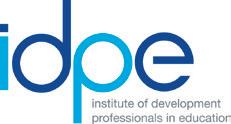
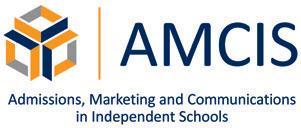




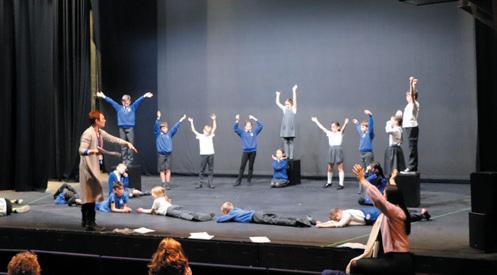
Robin Fletcher
Richard Harman


existential threat to our schools?
VAT on Fees An
MANAGEMENT INDEPENDENT SCHOOL The BUSINESS of INDEPENDENT EDUCATION Spring 2023 plus ADMISSIONS GOVERNORS BURSARS HEADS DEVELOPMENT In partnership with kampus24.com Personalised School Admissions PARTNERING WITH SCHOOLMANAGEMENTPLUS.COM Restoring Trust The lingering legacy of historic sexual abuse
Partnerships The benefits of crosssector collaboration
Prized
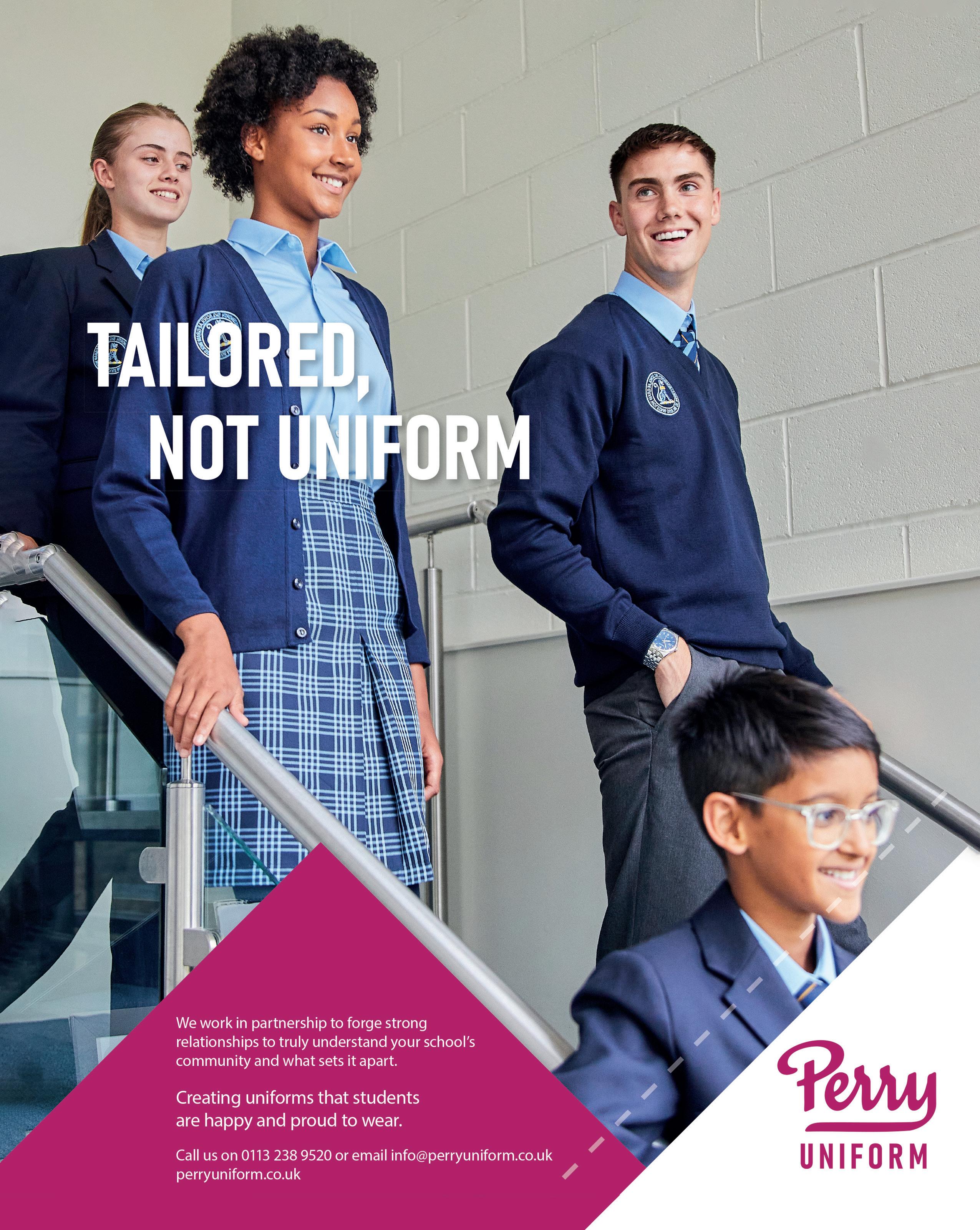
William Clarence Education
Green Park House, 15 Stratton Street, Mayfair, London W1J 8LQ
Tel: +44 (0)207 412 8988
EDITOR
Irena Barker editor@schoolmanagementplus.com
DESIGN & PRINT
Fellows Media Ltd
The Gallery, Southam Lane, Cheltenham GL52 3PB 01242 259241 hello@fellowsmedia.com
ADVERTISING
Jacob Holmes
jacob.holmes@fellowsmedia.com 01242 259241
PUBLISHER
William Clarence Education Ltd
William Clarence Education is a leading UK education consultancy working with independent schools throughout the UK, and British international schools overseas. williamclarence.com schoolmanagementplus.com
DISTRIBUTION
Print and digital copies of Independent School Management Plus are distributed to named headteachers, principals, bursars, marketing, development and admissions leads in every independent school in the UK, plus British international schools overseas. The magazine is published three times a year.
© William Clarence Education
No part of this magazine may be reproduced without the permission of the publisher. The information contained in Independent School Management Plus has been published in good faith and every effort has been made to ensure its accuracy. All liability for loss, disappointment, negligence or damage caused by reliance on the information contained within this publication is hereby excluded to the fullest extent permitted by law.
Foreword
Has the Labour Party’s decision to impose VAT on school fees, should it be elected, caused the hands of the sector’s own ‘Doomsday Clock’ to move closer to midnight? Many respected commentators believe so.
Responding to the huge anxiety felt across the independent schools’ community, this edition of Independent School Management Plus takes a long, hard look at Labour’s plans and questions whether the party leadership has really considered the consequences of such a move.
Describing Labour’s position as ‘folly’, Julie Robinson, CEO, ISC, urges colleagues to take the threat seriously and be prepared to fight (p6). Andrew Lewer MP, Chair, APPG for Independent Education, also believes that introducing VAT on fees will have serious implications but fears that the Labour Party is not listening to the debate it has sparked (p8).
Richard Harman, CEO, AGBIS, echoes Andrew’s advice to school leadership teams to prepare for the impact that Labour’s policy could have (p16), whilst Robin Fletcher, CEO, BSA Group, asks Keir Starmer directly whether the country as a whole can afford to underwrite his party’s plans (p15).
closer to the midnight hour...
Samantha Price, Headmistress, Benenden School, encourages Labour’s policy-makers not to regard independent schools as ‘the enemy’ (p20). She underlines the value which the sector delivers way beyond its own student communities through the ground-breaking partnerships with local state schools up and down the country.
Collectively, our contributors draw a cogent and compelling picture of the potentially disastrous impact that levying VAT on fees could have. We urge the Labour Party to stop, listen and draw back before irreversibly damaging one of the jewels in the UK’s educational crown.
The clock is ticking. It feels as if we are drawing much closer to the midnight hour. Let us do all we can to contribute to an informed debate.

Our School Management Plus online platform offers a wealth of information. Keep up to date and get involved:
• latest news, regular features and opinion
• monthly newsletter and jobs to your inbox
• contribute your own ideas and opinion
• join our webinars and round-table discussions.

We are the leading opinion platform for the successful running of a modern independent school. We are always keen to hear about the issues that matter to you most, so get in touch to have your school’s voice heard. editor@schoolmanagementplus.com

WWW.SCHOOLMANAGEMENTPLUS.COM
 Incorporating Conference & Common Room
Incorporating Conference & Common Room




































EDITORIAL ADVISORY BOARD
Dr Helen Wright
Educational consultant, former Head of St Mary’s Calne and President of the Girls’ Schools Association
Tory Gillingham
AMCIS CEO, former Marketing Director at Pocklington School and Marketing and Development Director at St Peter’s School, York
Ian Hunt School board member in the UK and Middle East, leader of international educational projects and a contributor to the national press
Richard Harman
CEO of AGBIS. Previously Headmaster of Aldenham and subsequently Uppingham. Past Chairman of the BSA and HMC
Louise Bennett CEO of IDPE (the Institute of Development Professionals in Education)
Robin Fletcher CEO of the BSA and the BSA Group
Nick Gallop Headmaster, Brighton College International School, Bangkok; regular contributor to the TES and editor of Politics Review
Donna Stevens CEO of the Girls’ School Association
Mark Taylor Bursar, King’s School Canterbury; previously Chairman, ISBA
The Folly Of

Policy
VAT ON FEES
6 The Folly Of Labour’s Policy A curse or an opportunity?

10 Tin Foil Hats Or Social Engineering? Labour and independent education

15 Really Keir? Is Labour asking the right questions?
16 Hope For The Best, Plan For The Worst Labour’s policy on independent schools



19 Do Your Homework! It’s always sensible to check the figures
20 Prized Partnerships School communities working together
HEADS & GOVERNORS
26 Restoring Trust The impact of historic sexual abuse cannot be sidelined


BURSARS
28 In Conversation With 20 Prized Partnerships
28 In Conversation With Angela Lezar, Matron at St Mary’s School Cambridge
DEVELOPMENT
32 Promoting Social Mobility An inspirational bursary journey
PARTNERS
39 GSA Spearheading Critical Insights: Ground-breaking GSA research
40 AGBIS Looking into the future: AGBIS conference report

41 BSA The Visa minefield: Help is on hand
42 AMCIS Partnerships: Are we shouting in the right direction?
45 IDPE Professional Development: The key to being the best we can be
49 Talking Point A Total Curricular Approach:The best way to deliver a rounded education?
Spring 2023 | schoolmanagementplus.com | 5
CONTENTS
VAT on Fees An existential threat to schools? Julie Robinson Lewer Fletcher Harman MANAGEMENT INDEPENDENT SCHOOL INDEPENDENT EDUCATION plus ADMISSIONS GOVERNORS DEVELOPMENT PARTNERING SCHOOLMANAGEMENTPLUS.COM Restoring Trust The lingering legacy of historic sexual abuse Prized Partnershipsbenefits crosssector collaboration ON THE COVER VAT on Fees Page 6-20
6
Labour’s
THE FOLLY OF LABOUR’S POLICY A CURSE OR AN OPPORTUNITY?
“May you live in interesting times.” This curse, coined by a British diplomat in the 1930s, has always puzzled me. Why wouldn’t people want to live in interesting times –how could that possibly be something ill to wish upon someone? And then Labour’s VAT policy made our winter very interesting indeed…
Labour’s plan is not a new one. It was first introduced in 2019 – before Keir Starmer was even leader. And it had been announced as Labour policy back in 2021, and rarely referenced since then.
Ideological
JULIE ROBINSON
 Chief Executive of the Independent Schools Council.
Chief Executive of the Independent Schools Council.

This changed in November, when the Chancellor, Jeremy Hunt, mentioned the policy at the despatch box. During his autumn statement, he said: “Some have suggested putting VAT on independent school fees as a way of increasing core funding for schools, which would raise about £1.7 billion. But according to certain estimates, that would result in up to 90,000 children from the independent sector switching to state schools, giving with one hand only to take away with another. So instead of being ideological, I am going to be practical.”
The £1.7 billion estimate Hunt mentioned was – and is – Labour’s claimed per-year revenue from such a policy, calculated from multiplying the sector’s yearly fees revenue by 0.2, and taking nothing else into consideration.
The figure of 90,000 children leaving the sector came from the Baines Cutler report, an ISC-commissioned study. By examining finances, exploring data and even – shock horror – talking to the parents who would be impacted, Baines Cutler found that far from raising money, Labour’s policy would end up costing the taxpayer £400m a year by the fifth year, leaving no extra money for state schools.
6 | schoolmanagementplus.com | Spring 2023 VAT ON FEES
Julie Robinson urges the sector to take Labour’s policy on independent schools seriously and offers guidance on how schools can mobilise parents and students to capitalise on the increased level of public scrutiny and make the case for the huge contribution we make to our communities.
We must fight it...
Make the case
These points were debated in the media spotlight over the end of November and the start of December. It seems both parties saw the policy as a way of making a wider point about themselves and their opposition. But, interesting though it was, it gave us a unique opportunity to make the case for our schools, and the public benefit they provide, accurately and loudly.
We were able to show that while fees had risen above inflation, bursaries had risen even further –with more students being helped by greater amounts of money (in fact, over a third of students at ISC schools receive some form of fee remission). Oxford Economics provided information showing the value of the sector to the economy: the fact that our schools support £5.1 billion in tax every year, while saving the taxpayer a further £4.4 billion by educating students who would otherwise take up space in the state sector.
We were also able to highlight that this policy is one that affects choice: the right of parents to F
Why it’s different this time
• Labour can do this: this isn’t the same party that threatened to abolish our schools. This is a political force that has thought through their ideals and matched them to what is legally and politically possible.
• Labour want to do this: it might not seem it sometimes, but people, by and large, don’t hate our schools. They don’t wish us ill, but nor do they particularly care. So this isn’t a vote winner, this is part of Labour’s vision for their next government – and that’s a problem, because there’s only so far statistics can challenge that.
• Labour will be able to do this: short of an unprecedented series of events – which, given the past few years, we shouldn’t rule out – Keir Starmer will be prime minister and Labour will form the next government. This isn’t opposition politics. They are planning for what they will do once they have the keys to Number 10.

Spring 2023 | schoolmanagementplus.com | 7
This is different...
choose how they spend their money and to choose the right school for their child. And it would be a tax on education – breaking the principle that education is not taxed, and making England an international outlier.

Threat to the sector
While all this has been going on, some have pointed out that things have been interesting for our sector before. This is true. But this is different to any threat the sector has faced before, and different to any Labour policy that has been mooted for our sector previously.
Put simply: we need to take this seriously. We must fight it and plan for the possibility that it could happen anyway. If we do not, our teachers, our parents, and our whole communities will ask searching questions about what exactly we were doing while this was going on. And they’d be right to do so.
Local focus
So far, so interesting. “But where does my school come into it?” I hear you cry.
While the ISC is working hard at a national level to talk to the press and politicians about the policy – and it’s important to stress that we are fighting the policy Labour has presented, not opposing Labour as a political party – we can create noise, but it’s you on the ground who can make a difference by turning that national noise into a local focus.
Internally, you need to be as honest and reassuring as you can be with parents and staff. Many of you will
have already started messaging around this and you should have received ISC guidance on the current situation and how to talk to your stakeholders.
Outlining concerns to your community about the policy is important because your parents and your staff are our greatest assets when it comes to persuading others about the folly of Labour’s policy. Encourage them to get on social and share their thoughts. And definitely encourage them to speak to their local politicians about their concerns – not just their current MPs, but their candidates too: get them to shout about it loudly and often. (And please make sure you’re also writing to your MPs, explaining the potential impact on their constituency and inviting them in for a visit.)
Partnership work
Externally, we need to demonstrate exactly what we provide to society. For most of you, that means the valuable partnership work you do that puts you at the heart of your communities. Show that it’s a collaborative effort between state and independent schools to share best practice to drive up educational standards for all. And talk to your state partners about the possibility of their joining with you to highlight the importance of your partnership work: we need people outside the sector pointing to the damage that could be done if work is slowed or lost.
Bursaries
I know that a lot of you will also be doing generous and innovative work with bursaries, so don’t be afraid to talk about that. The absolute best part of there being more of a focus on our sector is that we can get people talking about all the great things our schools are doing to improve education for every young person.
Sensible solutions
Despite how interesting the times are, I can’t fully see it as a curse. Because I believe that as people look more closely at our schools, the good they do for the children in their care and for the local community only becomes more apparent. We want to work with Labour on sensible solutions to improve education for all children, building on the amazing work you are already doing. We hope they take us up on that offer. ●
8 | schoolmanagementplus.com | Spring 2023 VAT ON FEES
YOUR SCHOOL’S VALUATION:
WHAT’S INVOLVED?
You may be considering purchasing an independent school, developing a new SEND school or sixth form, selling or transferring ownership of a school or simply seeking to reflect the worth of your school in your accounts. In fact, any aspect of holding an interest in property is likely to require a valuation at some stage. So, what aspects of the operation of the business are tested in practice as part of the valuation exercise?

Income
The calculations will be based on the number of students in each year group, additional
By Richard Green, Director of Valuation Services, Christie & Co


income, bursaries and so forth, and the valuer assessing the sustainable level of occupancy or roll numbers. This will have regard to historic occupancy and factors that might affect future occupancy. The level of fees being charged will also be considered, as will scope for fee increases and other potential revenue generating activities.
Expenditure
The four main assessment categories are:
• Staffing
• Direct costs
• Premises costs
• Administration costs
The end figure
The end figure, or the ‘Market Value’, is a number that includes the property, the fixtures and fittings and any goodwill attributable to the business. To reach this, the level of operating profit is multiplied by the appropriate multiple, known as a Years Purchase (YP) for that property. The valuer will primarily have regard to transactions involving other broadly comparable schools. This evidence of actual sales is then interpreted in relation to the subject property. ●
For more information and for a confidential chat regarding your business valuation, contact Richard Green: richard.green@ christie.com / 07717 335 613
ARMLEY GRANGE SCHOOL

SOLD
FORSALE
Buy. Grow. Sell.
Following a confidential sale process, this unique campus, which had been renovated to a high standard for SEMH provisions, was sold to a leading provider of children’s services.
Set in a 138-acre freehold Sussex estate, the former Pestalozzi International Village incorporates a range of former residential and educational buildings providing circa 3,387 sq m (36,467 sq m)

of accommodation, surrounded by former sports pitches and agricultural land. Pestalozzi’s permitted planning use is as an educational and residential institution and there is an existing consent which would allow for the development of a further 2,922 sq m (31,453 sq ft) of accommodation on site.
FOR FURTHER INFORMATION, PLEASE CONTACT: Courteney.Donaldson@christie.com
For advice about buying, growing or selling a childcare or education business, Speak to the experts: E: childcareandeducation@christie.com | T: 0203 846 0623
Spring 2023 | schoolmanagementplus.com | 9 ADVERTORIAL
Under new ownership, Armley Grange School, operated by Options Autism, will cater for autistic children and young people aged 5 – 19 who may have a range of additional needs.
PGL PESTALOZZI
TIN FOIL HATS OR SOCIAL ENGINEERING?
LABOUR AND INDEPENDENT EDUCATION
Andrew Lewer MP, Chairman of the All Party Parliamentary Group for Independent Education, considers the likely impact of the Labour Party’s plans to impose VAT on school fees, amongst other proposed changes.

Labour repeatedly uses the expression ‘tax breaks’ about the fact there is no Value Added Tax (VAT) on education, including independent education. In a recent Commons debate on this, I was very clear as to my view: “These repeated references to ‘tax breaks’… simply just paying extra tax on top of people’s income tax that they have already paid… is a very misleading description.”
Although Labour’s plans for the independent education sector under Keir Starmer are not as draconian and undemocratic (and indeed questionable in law) as they were in the Corbyn period – when it looked like they were trying to
abolish the sector altogether – they are still very worrying indeed. With Labour so far ahead in the opinion polls (at the time of writing) the sector is, overall, probably more rightly concerned than they were towards the end of 2019.
Inherently charitable
Politicians often speak or write about ‘long-held principles’ in national life, but sometimes these prove not to be as rooted in antiquity as expected. However, the principle of education as being an inherently charitable act has stood for a very long time indeed. Perhaps as far back as the 1547 Chantries Act which provisioned for ‘the keeping of grammar schools’, but certainly since 1601 with the passing of the Charitable Uses Act which explicitly specified for the first time what constitutes charitable activity. This included ‘schools of learning’ and ‘free schools and universities’. This language was also adopted over two hundred years later in the Mortmain
and Charitable Uses Act of 1888. Indeed, the ethos of charity runs through the veins of many independent schools such as Winchester College, for example, which was established to ‘educate poor scholars intent on school studies suffering from want of money and poverty’.
Tax applied to the goods and services we buy is of course a much more recent idea, with the precursor to VAT, the Purchase Tax on luxury goods dating from 1940, rooted in the wartime need to marshal resources efficiently. School fees were of course excluded from this from the very beginning. Under the terms of the 1988 Taxes Act, registered charities – such as many independent schools – do not pay a range of taxes; they are entitled to relief on their business rates and are not subject to capital gains tax or VAT. The most significant recent change in
10 | schoolmanagementplus.com | Spring 2023 VAT ON FEES
...very worrying indeed.
is a Member of the Commons Education Committee and Chairman of the All Party Parliamentary Group for Independent Education.
andrew LEWER MBE MP
this area was in 2006 with the Charities Act, from which point schools were no longer automatically entitled to charitable status but had to actively demonstrate ‘public benefit’.

Serious implications
Labour’s plans have serious implications for all schools and for society more broadly. Of course, independent schools – and the organisations that speak for them – will want to shout out about all the public benefit that independent schools provide. They are right to do so, even though my reading of the Labour Party’s mood on this subject is that no amount of reasoned argument is going to dissuade them from their proposed course of action if they win the General Election in 2024.
Compelling financial arguments
I do not believe the compelling financial arguments of the Baines Cutler Report proving that VAT on school fees will ultimately cost the taxpayer more, close historic schools and damage state educational provision will change their minds.
Nor do I think the legal minefield of trying to apply VAT to one form of education and not others will shift them, nor the risk to the partnership work undertaken with the state sector that the vast majority of independent schools engage in (well documented in the Independent Schools Council’s annual Celebrating Partnerships Report)
No, Labour are not listening and what this will mean is that excellent schools – those that survive the new tax burden! – will not be able to offer access to their academic excellence to as many bright young people from less advantaged backgrounds through their bursary programmes as they now do.
People like Keir Starmer, in fact, the son of a nurse and a toolmaker who benefitted from an independent school charity in attending what became an independent school following a previous Labour attack on social mobility with the abolition of direct grant grammar schools in the 1970s. (Followed by the abolition of the Assisted F
Places Scheme, one of New Labour’s Pledge Card items, in 1997. See the pattern here?)
The right thing to do
I visit many independent schools and I know that, where they can, most will move heaven and earth to continue to do the good work they do, even if they lose charitable status and, I would argue more seriously still, if they are forced to charge VAT on school fees. They do this work because it is the right thing to do, not just to tick a ‘charity’ box or achieve some sort of vague ‘feel good factor’. This is evidenced by similar work that many proprietorial, profit-making, schools do, too, without the same legal obligation. However, with VAT on fees, some will not only cease doing this work, they will close altogether and others will be forced to choose between bursaries and partnership work and keeping fees at as an affordable level as possible for the ‘squeezed middle’ (in this context defined as those on decent but not stratospheric incomes who already make great sacrifices for their children’s education [and thereby relieve pressure on state schools and thus improve provision there too]).
Tin foil hat
This may seem to some to be reaching for the tin foil hat but, nevertheless, I see a subtext to Labour’s plans for independent schools that is not mere conspiracy theory. I think their plans are designed to make independent education ever more elite, thereby making it harder for politicians, such as myself, to advocate for it.
I often use the analogy of a jacuzzi in the back garden versus a private jet in this context. You may never have a jacuzzi in your garden, but many of us would probably be able to afford to install one if we chose to do so. A private jet, on the other hand, is, for virtually everyone, an
unobtainable fantasy for a distant elite with no connection to our lives. That is what Labour wants independent education to be: the private jet not the jacuzzi. Thereby people are ever more dependent on the state and feel that for them – and for virtually everyone they know – no realistic alternative exists. Gone will be the comfort of knowing independent education is there, providing a comparator and a yardstick, even if you never use it yourself. That is bad for society and bad for state schools themselves; they will no longer have other kinds of schools to be compared to nor the chance to learn from the freedom to innovate that independent schools possess and which the wider school system can subsequently adopt – or reject.
Digging deep
It would suit the argument of those opposed, like me, to Labour’s planned assault upon independent education to assert that their imposition of VAT on fees will lead to immediate catastrophe for the sector. I fear that, although there will be some schools that close right away, the real impact will take longer to be felt but will be no less severe for that. Even though many are already digging deep, I think most of the parents of children already in the independent system, especially in Year 10 and above at the time Labour legislates, will not wish to disrupt the education of their sons and daughters and will go from already large sacrifices to Herculean ones to see them through. Instead, the damage will become evident later on. It will be the parents of prospective Year 5s who had hoped to educate their children independently who see fees rise out of their reach. It will be the parents of future Year 8s, who were going to pay for Years 9 through to 13, who decide just to pay for the Sixth Form instead, or not at all.
Value and strength
The sector must continue to tell all who are prepared to listen about the value and strength they provide to the educational ecosystem of this country. Alas, I fear those who are simply not going to listen are those who, if elected, will be able to cause great harm to independent schools the length and breadth of this land. Their actions will do the most damage of all, paradoxically, to those schools which are the most accessible and the least ‘elite’. There can be no doubt that every school in the independent sector must have Labour’s educational policies at the very top of their risk registers and should already be preparing for how to cope should they come to power. ●
12 | schoolmanagementplus.com | Spring 2023 VAT ON FEES
Labour are not listening…



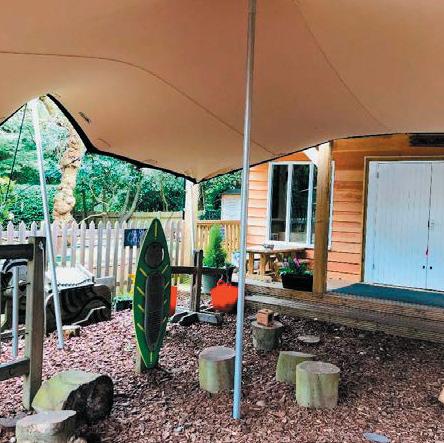
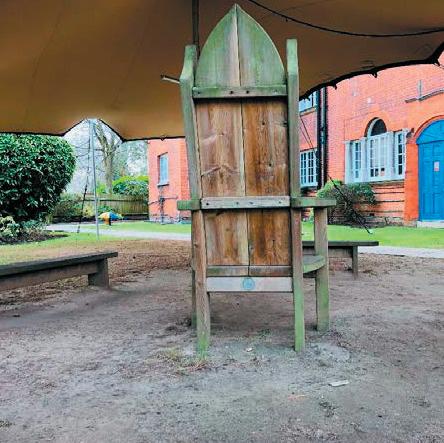




Spring 2023 | schoolmanagementplus.com | 13 Create covered outdoor space Cost effective Stretch Tent covered space with full installation and friendly advice! Tried and trusted up and down the country Purchase & long term hire available Tel – 01920830256 Email – info@alternative-stretch.co.uk www.alternative-stretch-tents.co.uk


















































14 | schoolmanagementplus.com | Spring 2023 • Headship recruitment • Inspection readiness check • Pupil recruitment accelerator • Mystery shop & Customer journey review • Marketing strategy support • Strategic planning support • Leadership team appraisals • Foundation and Alumni support • Video and animation Specialist support services for independent schools. We've done the thinking, so you don't have to. headspaceacademics.com 01202 287181
REALLY KEIR? IS LABOUR ASKING THE RIGHT QUESTIONS?
Robin Fletcher questions whether the Labour Party has thought through the implications of its plans to impose VAT on school fees.

There are around 200 boarding schools in the EU, excluding the UK. Around 300 in the US, 100 or so in Canada, around 400 in Africa and about 175 in Australia. In the UK, there are more than 480 independent and state boarding schools, making it the world leader in primary and secondary residential education by size.
King’s Canterbury in Kent welcomed its first boarders in 597, while MPW in London has only just opened its doors to residential students. The UK’s boarding schools have educated 40 of the UK’s 57 prime ministers and have an unrivalled roster of eminent alumni.
hardship than maintaining a third car or a second home in the south of France. Perhaps for a very small number this is true.
A real stretch
For the vast majority, however, paying for school fees, let alone boarding fees, is a real stretch, more often than not requiring both household incomes and other sources of funding.
So Keir Starmer’s proposal to levy VAT on school fees is interesting. At face value it might sound good, either to Labour supporters or average voters. I mean, if
90,000 parents will withdraw their children...
But here’s the thing: world leading we may be, but boarding education isn’t cheap.
If you select one of the UK’s 30+ state boarding schools for your child, the tuition is free (actually paid by parents through income tax), but boarding will still cost £1,000 a month. And the fees of an independent senior boarding school is three times that.
Parents choosing boarding schools or independent schools, or both, are often caricatured as a lucky group for whom paying for education is no more of a
you ask the general question, ‘Do you think rich private schools should be taxed more to support poor state schools?’ you’re bound to find some who agree.
But, of course, the question, which as an experienced lawyer Keir Starmer probably knows, is flawed.
Because if you also asked, ‘If taxing rich private schools were to lead to i) thousands of parents withdrawing their children and returning them to the state sector ii) international students heading elsewhere than the UK and iii) dozens of
small schools closing, costing hundreds of jobs, do you think it should happen?’, you’d probably get a different response.
As someone who represents boarding schools, I have a dog in this fight, so my views are biased.
Unaffordable
What I think is irrelevant, however. Because I have read the independent Baines Cutler report which estimates that 90,000 parents will withdraw their children from independent education if the cost of VAT is added to fees because they can’t afford it. And many of those will be boarding parents.
So my question to Keir Starmer is: ‘If you want to transfer money from independent schools to state, how will you do this if there are fewer parents and schools to collect it from?’.
Everyone’s got a list of things they’d buy in an ideal world if they had lots of money. But they haven’t, so they don’t. ●
Spring 2023 | schoolmanagementplus.com | 15 VAT ON FEES
Robin FLETCHER
is CEO of the BSA (Boarding Schools’ Association) which represents more than 640 schools in 40 countries.
HOPE FOR THE BEST, PLAN FOR THE WORST
LABOUR’S POLICY ON INDEPENDENT SCHOOLS
Richard Harman urges school leaders to take Labour’s plans to impose VAT on school fees seriously and start planning their strategic and operational response immediately.
With spring in the air, and with pupil numbers in many of our schools looking strong, governors and senior leaders might be forgiven for thinking everything in the independent sector garden is rosy. But chill winds of change are blowing, and we need to be preparing for more challenging times ahead.
After 13 years in opposition, the Labour party is riding high in the opinion polls and starting to look and sound more like a government in waiting.
Attention has turned to the likely key points of their manifesto for the next general election, to be held by the end of 2024.
Declared intention
One clear, specific education policy they have articulated already relates to independent schools. It is their declared intention to remove ‘tax breaks’ from charitable private schools at the same time as imposing VAT on school fees.
This has been challenged robustly, both behind the scenes and in Parliament; the sums they claim it will raise to plough back into the state system (£1.7 billion per year, assuming a VAT rate of 20%) do not really add up, since there would undoubtedly be significant displacement of pupils into the maintained sector and this would end up costing the taxpayer money over the medium term. Not to mention the detrimental effect in local communities and economies of some private schools closing.
What is depicted by Labour as a policy of fairness
is, to others, a punitive approach to a sector that currently offers excellence and choice to the UK’s educational ecosystem. It could also end up piling more pressure onto beleaguered state schools and representing a net loss for the Exchequer. In the face of this pushback, though, senior figures in Labour have reiterated the policy at every opportunity –including at PMQs and in an opposition day debate. What this tells us is that it is a high political priority for them. If they achieve a majority, it could well be enacted early in their time in office.
Charitable status
Some have reported this as being a threat to charitable status of independent schools itself, but it is worth making two points here.
Firstly, there is no proposal to legislate for the removal of that status per se, and indeed that would be difficult to achieve and open to significant legal challenge. Instead, the proposal is to remove the tax benefits that go with charitable status, whilst keeping in place the charitable duties and responsibilities of

16 | schoolmanagementplus.com | Spring 2023 VAT ON FEES
Richard HARMAN
Chief Executive of AGBIS. He was previously Headmaster at Aldenham and subsequently Uppingham. He is a past Chair of BSA and HMC.
governors (where they are also trustees). As a reminder, tax benefits that might be at risk include Mandatory Business Rate Relief, exemptions from Corporation Tax, the ability to reclaim Gift Aid on donations, Capital Gains Tax and Stamp Duty in certain circumstances.
Secondly, the proposal to impose VAT on fees would apply across the piece, both to those schools that are charitable (or to put it more accurately, are owned and operated by charities) and to those that are ‘for-profit’. So, in essence, this would be a double whammy.
VAT and charity laws are both highly technical and complicated areas but, to cut a long story short, it looks likely that it would be possible for a new government to enact these policies, introducing the measures in a Finance Act and withdrawing existing VAT exemptions from schools quite speedily, in order to hit their intended target(s).
...cash is king.
What should we be doing now?
On the basis that we should always hope for the best but plan for the worst, what should governors and senior leaders be doing now, in response to this clear threat?
Heads, bursars and governors need to collaborate on timely and effective planning. Governors need to give their executive teams the necessary support and encouragement to continue delivering effective financial management alongside high-quality education over this period of change. They should ask themselves some key questions. What impact would Labour’s proposed tax changes have on the school? How would they prepare for it and deal with it? Have they undertaken parental affordability analyses or recently assessed the local market in which they operate?
Schools need to ensure that all members of the Governing Body and SLT are fully aware of the issues at stake and the nature of the threats. They should all have read the joint ISC/Association Executives’ letter sent in October 2022. Governors and senior leaders should be attending relevant events (webinars, seminars, conferences) put on by AGBIS, ISBA and the Heads’ Associations.
Scenario planning
Have the governors asked the SLT to do scenario planning as to what the impact might be if Labour’s tax policy was implemented in the next two or three years?
Are the risks identified in terms of timing and effect? For example, do risks combine to make a particular year, or part year, more difficult than others? Also, how well does the school know its current and future parents and how they might pay fees? Leaders will need to assess
what impact 20% VAT (and higher fees more generally) might have on affordability and consequently on pupil numbers, fee income and the school’s financial reserves.
An important question is whether the school would need to pass on the full VAT rate to parents or whether it could absorb some of the burden, and if so, how? What impact would the loss of charitable reliefs (aside from VAT) have on fees?
Charitable schools should consider potential restructuring that might assist them ahead of any changes and will need to take legal advice as appropriate. Five-year forecasts will need to have been stress-tested against a range of scenarios. Then, consideration must be given to what actions are needed to mitigate the risks. For example, reviewing the reserves and investment policies, levels of surplus, fees in advance schemes and fee remission levels. Careful cost management, TPS membership, staff/pupil ratios, class sizes, curriculum and the number of staff at the establishment all need to come under review.
Strategic plans
Schools will need to review how Labour’s tax policy, if implemented, would affect their strategic plans. Do they need revisiting? If governors are also charity trustees (i.e., the school has charitable status), they will need to consider what is in the best interests of its assets, reputation and beneficiaries in terms of planning for the impact of Labour’s policy.
Have governors and the SLT discussed a near-term, sustained, strategic communications plan to build understanding and support among internal and external stakeholders? Leaving it until the changes come to pass will be too late.
Bursars and Heads can use the ISC’s excellent local economic impact tool, which allows them to quantify the school’s local economic impact (an ISC member login is required).
And always remember that the school is also a business, and in a business, cash is king! ●
Recommended immediate action
1. Update risk registers now to include the likelihood of tax changes.
2. Take measures now to weather the economic storm that lies ahead.
3. Plan now how you would respond if Labour implemented its proposed tax changes.
4. Prepare a balanced communications.
Spring 2023 | schoolmanagementplus.com | 17 VAT ON FEES

DO YOUR HOMEWORK!
IT’S ALWAYS SENSIBLE TO CHECK THE FIGURES
Ben Vessey highlights the economic value of the independent school sector and its contribution to social mobility and cross-sector partnerships.
BEN VESSEY
Huge strain
would otherwise take up a place in the state-funded sector.
Canford is no different in terms of its contribution to our local community, local job market and local economy as the following demonstrates:
• Our total contribution to GDP is £38.9m, of which 50% is generated locally.
• We are just under 0.5% of Poole’s GDP and support just over 0.5% of all jobs in Poole.
Canford’s values, which focus on Purposeful Engagement, Courageous Attitude, Humble Ambition and Gracious Leadership, underpin our culture and our community. Our desire to make a difference to the lives of others in a meaningful way also lies at the heart our bursary programme and our engagement with community partnerships.
Canford is one of only a handful of independent schools which fully sponsors an academy school. The Bourne Academy, in East Howe, Bournemouth, is located in one of the most disadvantaged areas of the UK. Since opening in 2010, it has flourished with collaboration between pupils and staff at both schools enriching the lives of all.

The Labour Party’s plans to put VAT on school fees and remove business rate relief will put huge strain on this ambition; it is clear that those driving this policy have not done their homework and their arguments are well out of date. A new report from Oxford Economics quantifies the economic contribution of independent schools. In 2021, the report states:
• Schools affiliated to the Independent Schools Council (ISC) made a £14.1 billion contribution to the UK economy. That is equivalent to 0.7% of total UK GDP in that year, and equal to the total economic activity generated in a city the size of Sheffield.
• ISC schools supported around 282,000 jobs across the country, equivalent to the total employed population in a city the size of Liverpool.
• ISC schools contributed £4.3 billion in tax revenues. That is sufficient to fund the salaries of 115,000 full-time nurses. The study also found that independent schools save the taxpayer £4.4 billion annually by providing places for pupils who
• Total UK jobs supported by Canford is 867, about half on-site.
• Total UK tax supported by our activities is £12.4m, of which £5.9m is direct from the school.
• It would cost taxpayers £4.3m if our eligible pupils went to state schools.
Negative impact
Should the Labour Party’s plans for VAT on fees become reality it would have a significantly negative impact on the lives of many young people. I recently received a Christmas card from one of our bursary pupils which contained some beautiful and emotional sentiments. These were not purely words of gratitude for a wonderful education, but more about the raw excitement and pure joy the pupil enjoyed when viewing the vistas which had opened up through being part of the Canford community.
It is for this reason that, regardless of the financial, economic and political headwinds we face, we must keep finding the means to continue to provide the current levels of bursary support. I feel strongly that society and the world will be a better place as a result of such efforts which go far beyond the charge of tokenism which some level at us. ●
Spring 2023 | schoolmanagementplus.com | 19 VAT ON FEES
Headmaster of Canford School.
PRIZED PARTNERSHIPS SCHOOL
COMMUNITIES WORKING TOGETHER
Benenden School’s Partnerships Programme continues to go from strength-to-strength, at a time when the partnerships between the state and independent sector could come under pressure from limitations on budgets caused by the imposition of VAT on fees. Nick Rendall tells us more.
The Partnerships Programme at Benenden continues to gain momentum. The Volunteer Programme is firmly established in the Sixth Form. It is the school’s aspiration that every student at Benenden has a term’s worth of experience in one of our placements. Over the last year, we have sought to build the core of the Partnerships Programme around the Tuesday afternoon volunteering activity.

Wide variety of opportunities
This academic year, we have managed an excellent level of attendance from across the sixth form. There are a wide variety of opportunities from which to choose, from volunteering in the village shop to assisting with younger children in Benenden pre-school to wider community experience at the Tenterden Social Hub and our four local primary schools. This wide spectrum allows for our pupils to gain much in terms of experience. It is certainly popular, with the 60 places being quickly refilled at the end of every term, either by those keen to extend their experience or by others who have made space in their schedules to carve out time to attend.
The Benenden Memory Café is firmly established as a key part of the volunteering programme and benefits from the enthusiasm and effort of our staff expert, Susan Newsam. Working with Tenterden Social Hub, we have a bi-weekly event which is well attended by their members. Benenden pupils receive training from the Alzheimer’s Society in how to interact with those living with memory issues and then, guided by Susan, set about preparing and organising for the events. We also seek to provide variety using both external entertainers and our own musicians. We have also begun to use the wonderful new facilities of the Centenary Buildings in the school to help provide an excellent backdrop.
Events
Outside of our weekly core activities, there has been a continuation of wider partnership events. Since September, we have hosted a large musical event in the Centenary Hall, attend by more than 450 pupils from nine primary schools, working alongside the Kidenza Orchestral charity, and held a STEM Convention which involved five secondary schools take part, bringing more than 100 pupils.
Alongside these large-scale events, we have also seen departments creating new partnership events, with the drama department building on last year’s successful hosting of the Benenden and Goudhurst Primaries

20 | schoolmanagementplus.com | Spring 2023
Shakespeare performances in the school theatre, with a specific Shakespeare-focused workshop day, attended by a further five primaries. We are seeking to build on this success with a larger take-up of the Shakespeare performances in 2024; this year, we are working closely with the two schools to ensure they have excellent productions.
University admissions
We continue to be a hub for careers through the Wealden Hub. Benenden provides weekly newsletters to 12 local schools, complemented by regular streamed events, focussing on university admissions. Our Oxbridge Admissions Event, in which an admissions director from Oxbridge offered advice on the applications process, was shared with close to 100 external pupils from six local schools joining us for the event through live-streaming.
Planning is already underway for the biennial Careers Convention for 2024, where we are seeking to top our last attendee list of more than 300 local attendees. F
Volunteering at Benenden
• More than 25 schools engaged as part of Benenden’s Partnerships Programme
• 129 hours a week are devoted by Benenden students to volunteering activities
• 62 students in the Upper School are currently volunteering with our Partnerships Programme
• On average, 600 miles are driven each term ferrying students to their various volunteering destinations.
A MORAL OBLIGATION
Samantha Price, Headmistress, Benenden School
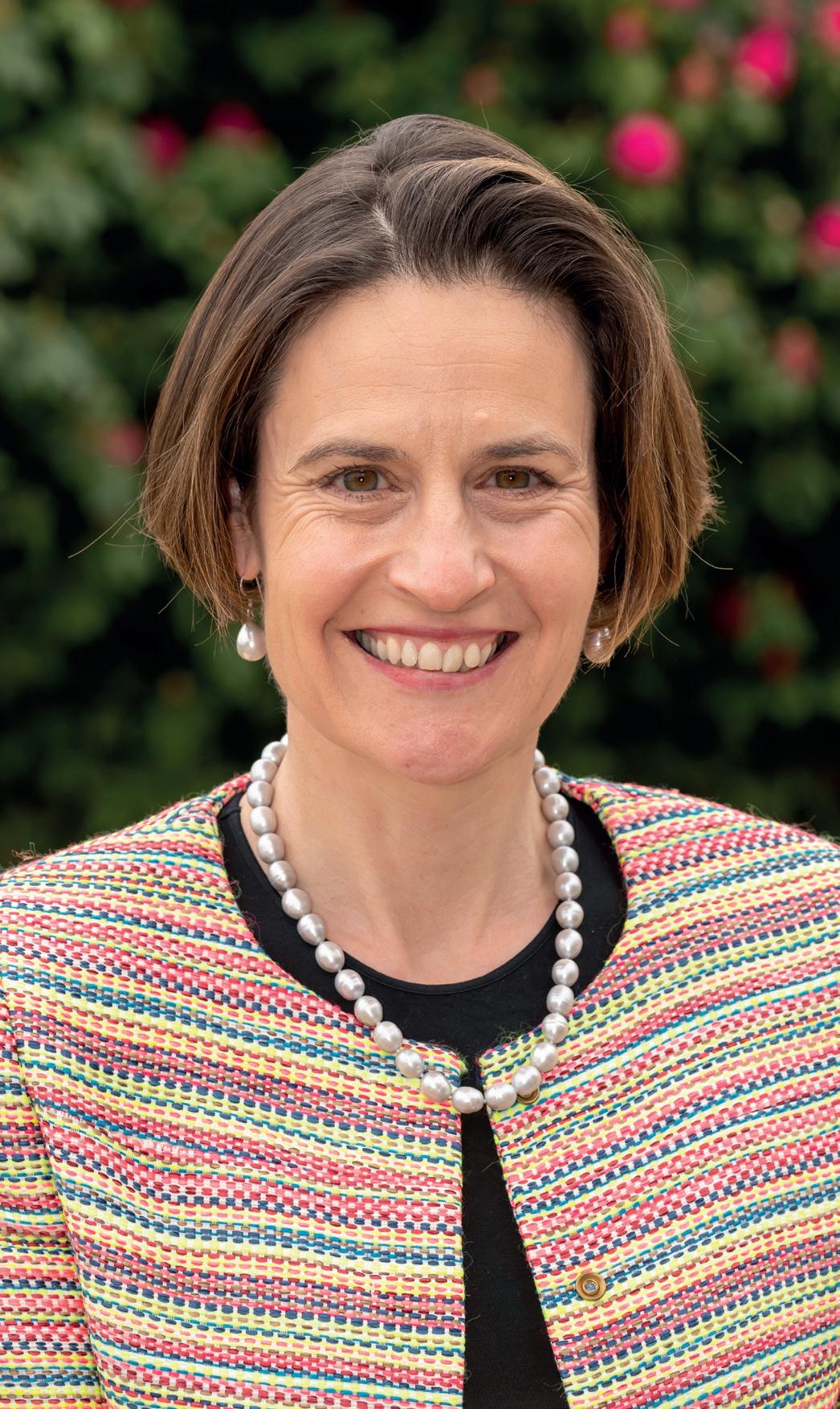
Barely a week passes without the independent education sector being publicly under fire, with the most common accusation being that private schools damage the state sector. Ironically, such criticism comes at a time when independent schools have never worked more closely with their state school counterparts.
Independent schools are not the enemy. All of us working in schools have a deep interest in the education of children in this country. Bashing the independent sector is not the solution for improving state schools. It is clear that greater investment is required in the maintained sector.
However, I do believe that independent schools have a moral obligation to support their counterparts in the maintained sector wherever possible. Independent schools offer bursaries and most, like us at Benenden, are trying to increase their provision in this area. However, the greatest way in which independent schools can reach as many children as possible is through partnership working.
We rarely read in the media about successful stateindependent partnerships but there are countless examples up and down the country. Sharing facilities, resources, ideas and experiences is incredibly enriching and, crucially, mutually beneficial.
Independent schools have a vital role to play in modern society, and a large part of that role is to engage with the community and to help others. Partnerships will never replace the government funding that state schools so desperately need, but the independent sector has a lot to offer – and is enthusiastically doing so.
Spring 2023 | schoolmanagementplus.com | 21 VAT ON FEES
“I volunteered at Benenden Primary School for the full year and found that it was something I really looked forward to doing each week. Every Tuesday, I would help the Reception class students read and write or just have a chat with them all, which at times was very funny. It is also something that was useful for my personal statement and CV when applying for things such as universities and gap year jobs. I would definitely recommend doing volunteering as it was a super fun and a beneficial escape from my A Levels!”

Lucy, Six Two student School partnerships

Benenden has continued with its strong commitment to STEM partnerships, especially at the primary level. Val Ross, Biology teacher here at Benenden, leads our Primary STEM Partnerships and which sees the School undertake such initiatives as providing essential resources, access to equipment, workshops for teachers, school visits by STEM ambassadors and competitions. Through this work Benenden connects with 14 schools from across Kent and Sussex.
Underpinning the Partnerships Programme is a sustained effort to offer quality and depth in our activities. Benenden staff and pupils enthusiastically give their time to set up, run, be involved with, and ensure that each event is successful. One major factor in making our events work is logistical support, with many partner schools lacking the access to transport to get to our events. With this in mind, we provide transport as far as our fleet allows, with members of staff individually also providing pick-up and drop-offs. To give you an example of the undertaking, every Tuesday afternoon our three minibuses undertake six drops-offs and picks-up, driving around 1,200 miles across the autumn and spring terms. For the Kidenza day, we completed nine pick-ups and drop-offs, ensuring we had attendance from three additional schools, totalling over 100 pupils. It took some careful planning!
John Wallis Academy
We remain deeply committed to our longstanding, bilateral Partnership with The John Wallis Church of England Academy through our mentoring programme and the combined cadet force. In addition to these core elements there is also regular sharing of information and ideas between academic departments, and staff placements as part of our teacher training programme.

We are looking forward to soon hosting another of our joint dinners between the two schools’ heads of departments. The John Wallis Academy pupils and staff are regular attendees at our events, including the Wealden Hub Literary, the STEM Convention or Kidenza. We work closely with our colleagues to maintain the strength in the relationship between the two schools.
The future looks busy from a partnerships perspective, with new regular events being planned over the course of the year. The relationships we have built up are strengthening all the time and it is so encouraging to see the vision of Benenden supporting its local community and the wider region in so many ways becoming a reality. ●
“I volunteer at the Memory Café every Tuesday where we plan sessions and celebrate music with the guests, many of whom have Alzheimer’s Disease. When the music starts to play and you get to see their eyes light up, it truly is an unparalleled feeling. Many visitors consider Memory Café the highlight of their week and it’s also one of mine. Volunteering has taught me empathy and helped me realise that even our smallest actions can have a greater impact than we think. The influence that our
Juliet, Six One student
22 | schoolmanagementplus.com | Spring 2023 VAT ON FEES
“It’s encouraging to see the pupils interacting so enthusiastically and building relationships with the Memory Café guests, as well as taking on board the opportunity to develop event management skills.”
Susan Newsam, Organiser of
the
Benenden Memory Lane Café
visitors have had on me is so much more than I could ever give back, and I hope to keep supporting Memory Café for as long as I can.”
NICK RENDALL is Director of Partnerships at Benenden School.
TWO-PHASE CONSTRUCTION
School estate teams have two key challenges to face when considering a new school building project.
To ensure the build is financially viable and to minimise disruption as much as possible. When considering a schools estate needs holistically, the new building should meet both immediate and future school requirements, along with balancing budget availability and ensuring that the project is viable.
A two-phase construction process can offer the best fit to such needs, with modular construction one of the only methods able to provide such a phased out approach to a build project.

Within modular construction an initial consultation is able to offer a vision of the structural aspects of both the first and second stages of construction.
The first phase of construction can be tailored to meet the immediate needs a school may have, such as a requirement for a new building due to existing facilities being unfit for purpose.
While the second phase of the construction process can factor in a need for future expansion due to either a predicted increase in pupils or a desire to provide a new state of the art teaching area.
This approach to a school’s estate needs,

offers vital financial savings. It cuts out a big drain of unnecessary resources by combining immediate and future planning requirements within one proposal, keeps site preparation costs to one building footprint and reduces disruption across the school estate.
Lady Eleanor Holles School in the outskirts of London, had a need to expand over a two year period.
Modulek were able to satisfy their requirement by addressing their immediate needs with a single storey classroom block. Modulek then returned a year later installing the second storey. One building footprint and minimal disruption.

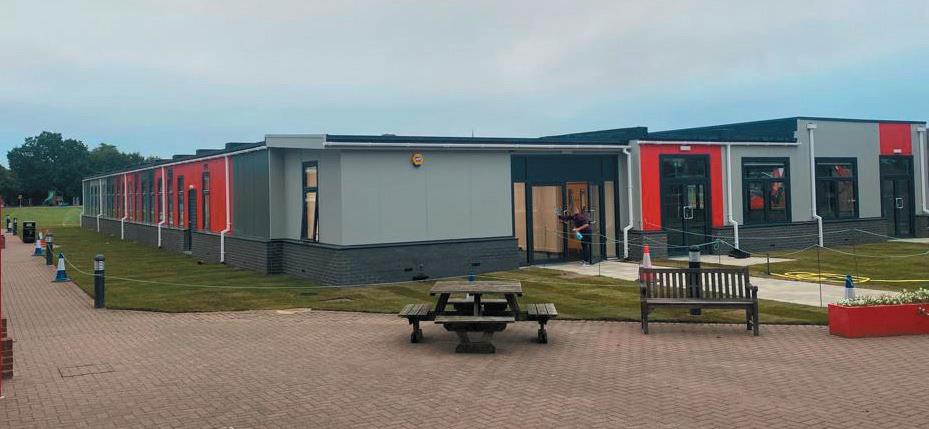

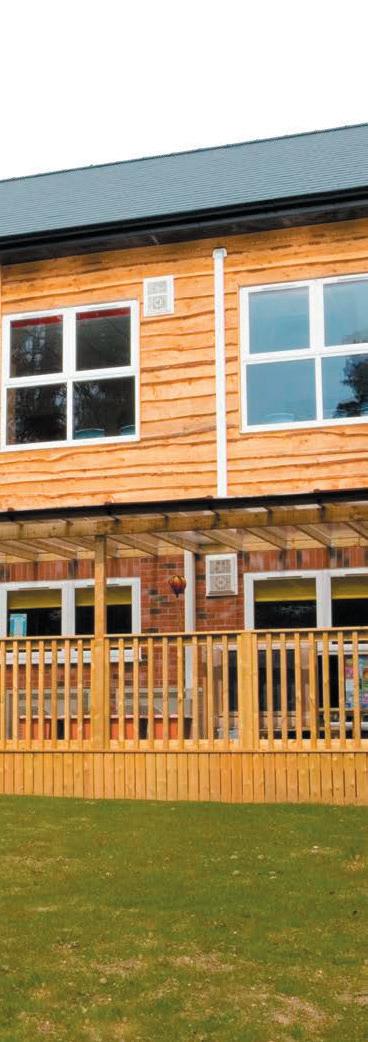
Constructed offsite and installed into place 70% finished, the first and second builds were both completed in a short timeframe with minimal disruption to the school. ●

Spring 2023 | schoolmanagementplus.com | 23 ADVERTORIAL
Please get in touch if you are considering best options for your school estate needs. modulek.co.uk or call 01202 813212 01202 813121 | sales@modulek.co.uk | www.modulek.co.uk Modulek Hose, 19 Bessemer Close Ebblake Industrial Estate, Verwood, Dorset, BH31 6AZ Designing and Constructing Educational Buildings for the Next Generation Solving Your Construction Challenges Traditional Construction Look and Feel Fast and Efficient Build Method Come and see us at: Independent Schools Association Annual Conference 18th – 20th May Independent School’s Bursars Association 23rd – 25th May Designing and Constructing Educational Buildings for the Next Generation Solving Your Construction Challenges Traditional Construction Look and Feel Fast and Efficient Build Method LTD Come and see us at: Independent Schools Association Annual Conference 18th – 20th May Independent School’s Bursars Association 23rd – 25th May
1
2
Phase
Phase









E: sales@connectcatering.co.uk | T: 01491 826000 | W: www.connectcatering.co.uk Connect Catering specialise in creating bespoke fresh food catering solutions to a diverse range of independent educational facilities and all aspects of boarding. You will have pride in the catering service Connect will deliver. Catering Fresh Food Everyday Family Owned & Run Contract Caterers Since 1989 T: 01491 826000 E: sales@connectcatering.co.uk Fresh Food Is Our Passion, People Are Our Strength
is an independent, award winning, unique, family owned, and run company. This passion for food is at the heart of everything they do.
Connect value the importance of their clients and support them confidently. Operating for over 33 years, they are innovative and imaginative and always following the latest food trends.
Connect’s catering experience, enthusiasm and energy ensures their chefs and teams are passionate about the service and fresh food they deliver; always with a smile. The training and support Connect invest to develop their teams ensure they are truly proud of the food they serve.

Connect’s food is always cooked from scratch; packed with flavour and nutritionally balanced as they know how important this is in early years development and throughout school life. The talented chefs at Connect source the best seasonal ingredients, from local suppliers, in a cost effective and sustainable way.

Connect offer a personal bespoke service for the independent education sector, ensuring that pupils, staff and visitors are nourished and nurtured. Their effective solutions are constructed around the client’s requirements and agreed budgets. The company has an open and honest approach with each school to ensure they reflect their ethos, aspirations and cultures, working hand in hand to tailor the service to each individual requirements.
This Is What Their Clients Say!
Independent School
“Just a quick note to say that I thought the lunch today (chicken pie and syrup sponge) was insanely good! Thanks so much for the efforts you go to, to keep the food standards so high. I know that people have been raving about the quality of the meals.”
Independent School
“I just wanted to share the amazing lunch we had today - an African themed lunch celebrating black history week and everyone was talking about how great everything was. Your catering team has been working so hard and we are happy to have them with us!”
Boarding School
“The food was very good and presented very well. All the visitors said that they really enjoyed it and the vegan/vegetarian meals were amazing. The students said the staff were very lucky to have a fantastic Chef and this standard of food on a daily basis.”
To Discuss Your Catering Requirements, Contact Connect:
underpins the way Connect do business. They love food and they have wonderful people to cook and serve it. Connect are small enough to care, yet big enough to support.
“
Connect Catering E: sales@connectcatering.co.uk | T: 01491 826000 | W: www.connectcatering.co.uk , Full Page Ad - March 2023.indd 7 27/03/2023 15:47:07 ADVERTORIAL
Fresh food is our passion people are our strength
“
RESTORING TRUST THE IMPACT OF HISTORIC SEXUAL ABUSE CANNOT BE SIDELINED
Alex Renton urges independent schools to acknowledge the ongoing impact of historic sexual abuse within our community and work to produce tough, clear, mandatory reporting procedures that make children in schools in Britain as safe as anywhere in the world.
I hear it often. I’ve worked for nine years on the issue of abuse, psychological and physical, and its cover-up in boarding schools; I have made programmes for ITV and the BBC, written a book (Stiff Upper Lip) and many newspaper articles on the subject. It’s just not survivors who fill up my inbox, but parents wondering if it is safe to send their children to board today. Ever since I first wrote about the abuse at my own prep school, Ashdown House in the 1970s, I have heard from many hundreds who suffered in similar ways, most of them at residential schools, state and

urely things must be different today?’ It’s the question I get asked most often by parents and by survivors of abuse at schools in the past. alex RENTON
private. Some want justice and apology, others compensation, but most often my correspondents are seeking the comfort of knowing that they are not alone in their memories of events that caused them lasting shame, guilt and suffering. The first thing I do when responding is try and direct them towards specialist therapy.
Tolerance of criminal behaviour
I have a lot of data from the inbox: over 1,100 significant allegations, naming nearly 300 institutions. Looked at chronologically, the complaints peak in the 1960s and the 1970s. A new Children’s Act in 1989 had a profound effect: it made safeguarding a science and a duty. Attitudes to children’s safety before then were, I think we can all agree, amazingly lax; in some schools that meant the tolerance of criminal behaviour among staff and, too often, the prioritisation of the institution’s reputation above all else. But on my graph, numbers of complaints tail off dramatically in the 1990s.
Our BBC radio series, In Dark Corners, on Eton, Fettes, Gordonstoun, Edinburgh
is a British journalist and broadcaster. He is author of Stiff Upper Lip: secrets, crimes and the schooling of a ruling class, which is available on Amazon and from bookshops.
HEADS & GOVERNORS
‘S
26 | schoolmanagementplus.com | Spring 2023
Academy and others showed how known violent and sexual offenders were not just tolerated but allowed to progress from school to school in the ’70s and ’80s. In all those stories, only one teacher was reported to the police when the school discovered what had been happening. These historic examples from famous schools reflected the practices of many others at the time – the stories I’ve collected make that all too clear.
More informed
It was a while ago. Of course, things are different today. The numbers of allegations I receive that refer to recent events is tiny, compared with those that date from the peak of the scandals. Not only are parents, teachers and the police more informed, but in today’s environment it is, you hope, far easier for children to disclose. At Ashdown House. We were punished for telling our parents if anything was wrong: that could not happen, you trust, anymore.
Nevertheless, statistics show that children who suffer abuse still may take a long time to come forward. While, thankfully, early boarding is becoming rarer, children are still uniquely vulnerable when away from home. Headteachers must know that an active environment of encouraging disclosure, by children or staff, is the only way, however cumbersome and time-consuming such protocols may be.
Recent failures
Because, despite all that has changed, I do still receive too many complaints about recent failures in safeguarding and disclosing systems. The most worrying

are those that seem wilful. Recently, I have heard from two teachers from a well-known private boarding school whose safeguarding concerns over one colleague’s behaviour with children were dismissed by the Head. When the complaint was taken in the correct fashion to the local authority ‘designated officer’, and then to ISI, excuses were found to push the troublemaking teachers who had raised concerns out of their jobs.
You may argue that there will be another side to such a story. But I hear too many like it, from teachers and parents, for anyone to relax. Safeguarding reporting mechanisms still seem unclear, too often based on ‘should’ not ‘must’, and they may be imperfectly backed up by the external authorities.
Beyond all that, I hear of schools, particularly smaller independents, where today’s financial squeezes and unprecedented shortages of teaching staff combine to put extraordinary pressures on management. I’ll paraphrase some Heads I’ve talked to: ‘Can you imagine running a school with gaps in the staff room and a load of unpaid fees when you suddenly find you’re going to have to suspend your best, most hardworking teacher, all on some half-formed suspicion from a difficult parent?’ You can sympathise. But, given what went so horribly wrong at my school and many others, what other way forward is there?
Paying the price
It’s clear that schools today, particularly in the boarding sector, are paying the price for the laziness and the arrogance of those who went before, 40 or 50 years ago. That is not fair, I am told. But if you trade on your history, as many independent schools do, you cannot pick and choose which bits of it to acknowledge. Any industry that has failed so badly in its core duty will suffer such pressure. There is a lot of trust still to restore.
How can that be done? First, by supporting the survivors of the historic catastrophes. Most schools where scandals have emerged know how to issue gushing statements of sympathy and concern – though not, of course, admitting any liability. But behind the scenes, survivors’ stories may be challenged, with lawyers and PR experts used to threaten the media. Many schools work to make sure they’re not named in court cases. That doesn’t look good. Sorry must mean sorry, even when under attack for failures in which you played no part.
Secondly, there is a grand opportunity in the coming months to get Britain up to speed with other countries on DBS and mandatory reporting. As I write, the Government is due to announce its proposals for new legislation for England and Wales, as requested by the Independent Inquiry on Child Abuse in October. I hope to see the independent sector, led by the good work of the Boarding Schools Association, work with organisations like Mandate Now to produce tough, clear mandatory reporting that makes children in schools in Britain as safe as anywhere in the world. It is the least we can do. ●
HEADS & GOVERNORS
Spring 2023 | schoolmanagementplus.com | 27
...children are uniquely vulnerable when away from home.
- IN CONVERSATION WITH -
ANGELA LEZAR MATRON, ST MARY’S SCHOOL CAMBRIDGE
Zoe MacDougall talks to Angie Lezar about her role as a Matron at St Mary’s School, Cambridge and explores the important part she plays in supporting the welfare and well-being of students who spend long periods of time away from home.
Priorities
In her pastoral role as one of five Matrons at St Mary’s School, Cambridge, Angie Lezar has two clear priorities: firstly, to form a loving relationship with the girls and, secondly, to help them get to where they want to be in life. As Angie says, “My whole purpose is to help people to achieve their potential. To be a part of helping the girls to figure out what they want in life and then encouraging them to go for it – what could be nicer!? The girls are diligent, determined and ambitious – and many of them
want to be surgeons or economists. There’s a whole vibe here of learning and excitement and love and life: the energy is so inspiring. It’s a privilege to work with these girls. To know that I have been a part of their early lives is a joy.”
School mum
4pm is a special time in Angie’s day. Just over 80 boarders are making their way home to Mary Ward House, a ten-minute walk from school. Angie is at Reception to welcome them. The girls come in, individually or in groups and pairs, their cheeks flushed from their walk. The younger girls are excited, eager to download their experiences of work and play as they sign in with her. Angie can see from their faces what kind of a day they’ve

28 | schoolmanagementplus.com | Spring 2023
Be open-minded...
had. Perhaps older girls have had a test, or a sports fixture, or a particularly heavy day of lessons. This special time of day is Angie’s opportunity to check in with each of the girls before they continue up to their rooms or to the dining hall for a cup of tea and a snack.
Angie describes her role as ‘like a mother’. For many of the girls, their real mums are on the other side of the world and, as boarders at St Mary’s, they are living in a strange country, learning in a foreign language, and adapting to an unfamiliar schooling system. So Angie thinks they need a ‘school mum.’
Angie’s interaction with the girls is what she loves most about her job. She identifies an ability to connect with the girls as her biggest strength: “I don’t like admin, or telling people what to do – just let me bond with you.” Angie recognises that girls learn best when they feel secure and comfortable; and that’s the atmosphere she aims to create at Mary Ward House.
Technology
Managing teenagers’ access to the internet is easier at school than it is at home! Whilst the girls are allowed to use WhatsApp and TikTok in Mary Ward House, there is education-level firewall security in the boarding house – as well as in the main school buildings – so a lot of unregulated material on the internet can’t be accessed. All technology is handed in overnight. Phone calls have to be made in a public place, such as on the sofa in the quiet but open reception area.
A light touch
The staff are vigilant, checking on the girls in their bedrooms mid-evening. Realistically, however, things don’t always go to plan. Angie recalls hearing three girls and a boy’s voice on a phone call in a bedroom. Sensitively, she kept her disciplinary measures light.” – “if the rules are too tight, teenagers have a habit of finding a loophole and going underground!” But the incident was shared with the pastoral team, and a senior member of staff followed up with those involved.
How to handle misdemeanours and mistakes without alienating teenagers by coming down too heavily on them is a dilemma many parents grapple with on a daily basis. Tidiness, for instance, can be an hourly challenge at home. Interestingly, in the hands of the professionals, this simply isn’t an issue. Some of the girls’ rooms are very neat and tidy; others less so. The policy in the dorms is relaxed and there are no repercussions for scattered belongings – except that, if the cleaner can’t see the floor, the room doesn’t get cleaned! Matrons sometimes say, “Please pick this up” – but nagging about tidiness isn’t part of their relationship with the girls.
Encouraging healthy eating is a further example of the merits of putting children in the hands of the
HOW ANGIE Found her Niche
Angie Lezar is Matron at St Mary’s School, Cambridge. St Mary’s has recently been named in Fortune magazine’s list of the top 250 boarding schools in the world. Angie’s varied life experiences have contributed to her special understanding of how to connect with boarding pupils at St Mary’s. She was originally a teacher in her native South Africa for 27 years. However, on moving to Britain she realised that teaching here would be very different to teaching in South Africa so she re-directed her career into life coaching and studying whilst working as a companion to an elderly lady. She eventually set up her own lifecoaching business but it struggled because of the pandemic. And then Angie’s niece, who had been a pupil at St Mary’s, encouraged her to look for a job with the school.

A year ago, Angie applied for the job of Matron, and found her niche: “It’s the perfect job for me – caring, educating and life-coaching. I love it!”
professionals. Girls have to come down and eat at meal times – although Friday and Saturday are more relaxed – and the Matrons at St Mary’s are extremely vigilant in the dining hall: “We dish up for all girls in years 5-11, so we see exactly what goes on their plates. Then one of us might say to another, this is the second day in a row that one girl has only had soup, for example. Then they’re on our radar. When we’re serving food, we’re also watching the girls and we can see if someone actually doesn’t eat that much. We remember who did what, who likes what and we get to know them very well. Any food concerns are then flagged up with the senior Matron, the head of boarding or the school nurse.” F
Spring 2023 | schoolmanagementplus.com | 29 BURSARS
Photo credit: Mark Bourdillon
A verbal relationship
Forming a warm, motherly relationship with the girls, whilst observing the strict safeguarding boundaries, requires real skill. The school operates a ‘no touch’ policy, so relationships between staff and pupils have to be verbal –and can’t rely on using endearments, which are deemed inappropriate.

Angie acknowledges that, in her native South Africa, “people are more used to touch, so it’s been difficult to learn not to do that.” But safeguarding is of paramount importance here, and rules need to be followed. So Angie loves to banter with the girls, as she feels that “laughter and teasing indicates a level of affection, of feeling comfortable in a relationship.”
Identifying vulnerabilities
The special position held by a Matron in a boarding house allows them to notice things that, perhaps, other staff don’t see. As Angie acknowledges, “Matrons get to see all the nitty-gritty of the girls’ lives.” Sometimes, a girl will withdraw into herself; she may be less chatty over the supper table, or spend more time in her room. Angie explains: “In the formal classroom, where a certain type of behaviour is expected, there is less room for deviation from the norm whereas in the boarding house there is more personal space. Sometimes the girls walk in and I can see from their faces that they have had a hard day, or they have a headache. I can just see it.” She counsels, “Be open-minded, listen, don’t make assumptions about any individual, and be ready to support those who are less socially comfortable than others.”
Teamwork
Matrons at St Mary’s liaise closely with academic staff. Angie explains, “Sometimes a girl hasn’t performed appropriately in a test, and that could be driven by an emotional issue. Or a girl may not be sleeping well and her tiredness in class is noticed by her teachers and that becomes a conversation between academic and boarding staff. Or if a girl is mis-behaving in assembly we will be alerted because there could be an underlying cause for concern. There’s a lot of monitoring, a lot of crossovers. And we try and step in as soon as possible where there’s a problem. We’d rather make sure there is nothing to worry about rather than assume it’s nothing and then discover we should have been more concerned. Even if a girl tells us ‘it’s nothing’, they know that we’re on the alert, so it’s easier for them to come back to us and maybe raise the topic concerning them. Sometimes if it’s a negative thing they’re getting into, they realise we’ve noticed and that can be enough to encourage them to change tack.
“Everyone is very good at liaising and comparing notes as a team. Sometimes you might think your evidence is just a flash in the pan, but everyone’s little pieces of evidence can add up to a whole picture of a girl’s wellbeing. We’re all on it, we all work together.”
Supporting school leavers
Having been so well cared for at school, it can be hard for the girls to leave at the end of Year 13. Angie has been instrumental in setting up an ‘out-duction’ programme for school leavers. Year 13 girls have enjoyed a self-defence workshop, a talk from police about personal safety, a talk from HSBC about credit rating and budgeting, a sexual health and well-being talk and a talk about interview techniques, CVs and application letters. The final ‘out-duction’ talk in the 2023 programme, was on social and mental health and was given by Angie herself, drawing on her life-coach training and qualifications.
Unsung heroes
Boxing Angie’s role – or that of many a Matron – into a job description would be a challenge for any HR department. Perhaps even Angie would be hard pushed to define how much she contributes to school life. For sure, Matrons are very often the ‘unsung heroes’ of school life who keep children safe and happy, ready to learn and play to their full potential in a boarding school environment. ●
ZOE MACDOUGALL is an educational commentator with extensive teaching experience in the independent and maintained sectors.

30 | schoolmanagementplus.com | Spring 2023 BURSARS
The Well-Being Room
Fordingbridge are industry leaders in canopy and walkway solutions to enhance outdoor learning opportunities throughout the year ; even on those scorching summer afternoons, and on blustery winter days.
Maximise educational environments with a range of Fordingbridge canopy solutions offering excellent safeguarding for students and ensuring impressive canopy coverage, even in those seemingly inaccessible spaces.
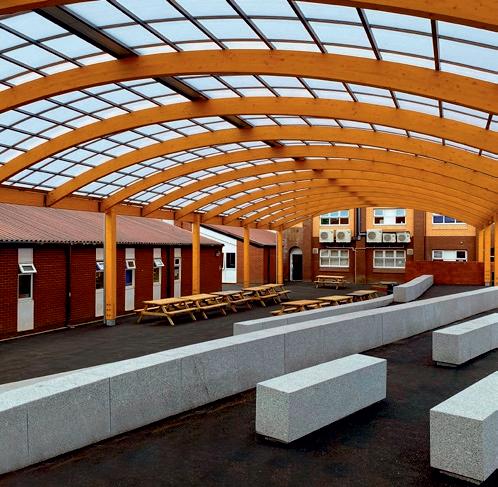




We offer the design and build of:
• Bespoke canopies •
• Turnkey solutions •

• Optimised walkways •
• Sustainable buildings •

Play, dine, grow, explore, & educate under sheltered spaces

Contact our sales team today to arrange a complimentary site survey.
www.fordingbridge.co.uk
01243 554455


info@fordingbridge.co.uk
Arundel, West Sussex, BN18 0SD
Spring 2023 | schoolmanagementplus.com | 31
PROMOTING SOCIAL MOBILITY AN INSPIRATIONAL BURSARY JOURNEY
Simon Jones believes that far from being a barrier to social mobility, as some opponents claim, independent schools have, from origin, led the way in transforming the lives of young people from disadvantaged backgrounds. Narrating the era of the Direct Grant and Assisted Places schemes, he celebrates the extensive high-value, transformational bursary programme Manchester Grammar School operates today.
This academic year sees the 25th cohort of pupils join the Manchester Grammar School (MGS) since the removal of the government-funded Assisted Places scheme, which enabled bright boys from modest backgrounds to attend the school in the period 1976 – 1997 following the removal of the Direct Grant scheme. MGS’s commitment to social mobility dates back to its foundation in 1515 by Hugh Oldham, Bishop of Exeter. The founding mission

of the school was to “educate the poor boys of Manchester in godliness and good learning”. A quarter of a century after the removal of government support to enable disadvantaged pupils to attend schools like MGS, it seems a fitting moment for schools in the independent sector to remind themselves of the history of the Direct Grant and Assisted Places schemes, and to reaffirm their commitment to providing transformational bursary places.
A journey
MGS was one of, if not the first school, to launch a major fundraising appeal to provide bursaries to replace the Assisted Places Scheme. The MGS community, led by High Master Martin Stephen, was determined that the school would not become just another fee-paying institution, where ability to pay rather than academic potential was the factor that determined whether or not a place could be taken up at the school. A journey started in 1998 with almost 40
32 | schoolmanagementplus.com | Spring 2023
from modest backgrounds. Even during the golden era of the Direct Grant, the school understood the debates surrounding the comprehensive system and their role within it. It is interesting to note, particularly in the context of the politics of today, the comments made by Leslie Lever, Labour MP for Ardwick, during a Commons debate on comprehensive education.
Hansard, 27 October 1975
pupils being admitted to the school from modest backgrounds for whom bursary funds had not yet been secured. Driven on by the best of all school mottos, Sapere Aude – Dare to be Wise – the school established a bursary fund and fundraising programme to ensure that boys from all backgrounds could still attend MGS and the institution’s meritocratic essence did not disappear entirely. The then-Prince of Wales became the Royal Patron of the MGS Foundation Bursary Appeal.
Social mobility

When social mobility is debated, where you are born is a more significant factor in determining life chances than any other single factor, including the type of school a child attends. Independent schools are often cited as being a significant barrier to the promotion of social mobility when, in fact, providing access to such schools to children living in areas with indicators of low socio-economic circumstances, can provide significant social uplift. MGS, with its location in inner city Rusholme, sandwiched between Moss Side and Longsight, has perhaps always been more acutely aware than most of the need to offer an education to bright, young minds
“What the ministry is trying to do is to see that every boy or girl has the opportunity of being educated to the standard of the Manchester Grammar School. It is not a question of bringing that school down – no Minister of Education on either side of the House will ever do that. The problem is to see that every boy and girl gets a chance of the education offered by such schools as Manchester Grammar School.” Hansard, 21 January 1965
During the early 1970s, more than 60% of the pupils at MGS had their fees paid for by the state, their local authority or by the school itself, and they were joined by boys from families who could afford fees.
Assisted Places
It was this social mix, which enabled boys from all backgrounds to become journalists, entrepreneurs, engineers and doctors, that MGS has always fought to protect.
MGS High Master, Peter Mason, was the driving force behind the Assisted Places Scheme which was adopted by Thatcher’s government in 1981 in his role as Vice-Chair of the HMC Direct Grant Joint Committee.
The Assisted Places Scheme that Mason designed, and successfully
lobbied for in Westminster, relied heavily on careful means-testing and its success during the 1980s and 1990s in providing a vehicle for social mobility was thus the inspiration behind the MGS Bursary journey, which began in 1998. The scale of giving, primarily from alumni, over a 25year period has been extraordinary. The Bursary Fund now in existence has assets worth over £30 million. Over the same time period more than 750 pupils have received a bursary place costing a total of £30 million. This cost has been funded entirely through philanthropy and not cross-subsidised by fee income, with the exception of hardship bursaries. All of the bursaries are means-tested and almost all of the awards are full-fee. The average bursary award is 93% of the fee and support is also provided, based on need, for uniforms, trips, travel, music lessons, lunches, etc.
Insufficient funds
Despite this success, the school is still a long way from delivering the sort of social mobility it achieved during the days of the Direct Grant scheme. Around 15% of the senior school benefit from F

a place on merit...
Spring 2023 | schoolmanagementplus.com | 33 DEVELOPMENT
“Perhaps the most famous direct grant school in the country is Manchester Grammar School. The home background of the pupils is as wide a range of people as will be found in any school in the country.”
a bursary, compared to 60% under Direct Grants. Each year the school turns away around 50 pupils who would qualify for a place on merit, because there are insufficient funds available. Yet, the school has a long-term commitment to raise the funds necessary to ensure that no pupil is denied their rightful place at the school due to a lack of parental means.
Where to start your fundraising campaign for bursaries


• A clear vision. At MGS, we want to raise the funds necessary to ensure that no pupil is denied their rightful place at the school due to a lack of parental means.
• A long-term commitment; building relationships is the foundation of any successful fundraising programme, but these take time.
• A team effort; your Head, governors and teaching colleagues are all ambassadors, empower them to share the value of bursaries.
• Demonstrate impact; share with your community how they are making a difference.
• Don’t delay – the sooner you start, the sooner you can support more young people and change lives.
IDPE and Gifted Philanthropy’s Schools’ Fundraising and Engagement Benchmarking Report 2022
• 85% of schools are raising funds for bursaries in 2021 (compared with 66% of schools raising funds for bursaries in 2018).
• Donors want to give to bursary programmes (53% of parents and 75% of alumni prefer to support bursaries over the next most popular projects/causes –Facilities (23% parents; 17% alumni)).
• There is an increased focus on transformational bursaries of 110% or 100% with 62% of schools raising funds for 110% bursaries now and 80% raising funds for 100% bursaries.
clarity of vision...
It would be wonderful to think that standard state funding for children in receipt of free school meals could follow them to an independent school, so that existing bursary funds could meet the funding shortfall. This model seems far away for now, although it is pleasing to note the provision of some financial support for Looked After Children in the independent sector as well as funding linked to educational health care plans.
Meaningful bursary provision
At a time when an increasing number of independent schools are focusing their attention on bursary provision, it is vital that schools stay the course and don’t get distracted by the economic and political headwinds facing the sector. Now is the time for independent schools to reaffirm their commitment to meaningful bursary provision for the long term. High-value, transformational bursaries are enormously expensive but necessary in the sector, and schools need to include this commitment in their long-term financial modelling. For many schools, a contribution from school fees, overseas franchises, historic endowments and other business interests will remain a core part of this provision, but all schools also have the ability to fundraise, as evidenced in the latest IDPE benchmarking report.
Strategy for the future
Bursary fundraising needs a clarity of vision and a commitment for the very long term. Successful bursary fundraising programmes will outlast the tenure of any headteacher, chair of governors or development director. Potential donors and recurrent donors are inspired by institutions and headteachers who can articulate their bursary needs and have a clear and obvious strategy for the future and a vision for the kind of school they wish to be.
Transparent financial and social impact reports, as well as appropriate donor recognition, give confidence and reassurance to the next generation of supporters. The more schools who can demonstrate their commitment to increasing bursary provision, the more successful the sector’s fundraising efforts will be. We, as educational leaders, need to work together and stick together on our bursary missions. After all, this is about future doctors, journalists, entrepreneurs and engineers, not about individual schools. ●
34 | schoolmanagementplus.com | Spring 2023 DEVELOPMENT
SIMON JONES is the Development Director at The Manchester Grammar School, Trustee of The Institute of Development Professionals in Education and a Trustee of The Bursary Foundation.
future proof, you need to invest differently starting right now
WHAT DOES EDUCATION RIGHT NOW MEAN TO YOU?
in managing that people getting investment. building support the competitive. about stories numbers. not to be would have independent
schools have closed and sadly others may follow. As I learned very early in my career when going through a redundancy process, invest in yourself and you secure your future.
The word ‘now’ in this context has a different meaning for everyone in your community. The meaning they attach to this is driving your school culture, reputation, academic results and personal wellbeing. According to Eckhart Tolle, If you get the inside right, then the outside will fall into place. What could education NOW really mean for you?
One three letter word that determines your daily personal and professional reality. If you were to write a list to answer this question, what would it say? What words would you use? What emotions are you experiencing as you write?
Network Of Wellbeing
For this academic year, I challenge you to invest differently both personally and professionally. Believe it or not, you are a knowledge broker with skills and expertise that can help. Today, is time to start acting. It is as easy as 1, 2, 3.
2. How do you need to invest differently using the resources you have? To do this, think about putting a word before investment. Here are some guides... Alternative Investment Impact Strategic
Close your eyes for a moment and contemplate this question. What do you actively do for yourself? As a leader, you are modelling what wellbeing looks like to everyone in your community.
Navigating Our World
How are your navigating? What one thing can you do to move direction? To know yourself is to lead yourself.

1. Think about your portfolio. What return would you want to see in August 2023?
ads@independentschoolsmagazine.co.uk

Tracy Shand, personal development author, reflects about investing smart this academic year. Whatever role you have in a school, you are managing portfolios of futures. And that is tough! For young people investing to make them successful. For parents getting a return on their investment. For staff, it is about building their portfolios to support the vision and remain competitive. For sustainability, it is about building a portfolio of stories and experiences to create
3. Start your investment tracker. What actions will you take to build your portfolio to create a return and reduce risks?
Do you need to make changes? Just one change... because as you know New Options Work if you take one step a day. Summer 2023, it is time. Time to plan forwards to step into your next ! ●
Risk or return? What is your gut telling you about where you are right now? It is time to put your future in your hands, now invest in a pen.
curiosity to build numbers. Sadly, when these are notmanaged effectively this causes your school not to be as future proof as you would like. Your world may or have changed. Some independent schools have closed and sadly others may follow.
As I learned very early in my career when going through a redundancy process, invest in yourself and you secure your future.
For this academic year, I challenge you to invest differently both personally and
professionally. Believe it or not, you are a knowledge broker with skills and expertise that can help. Today, is time to start acting. It is as easy as 1, 2, 3.
1. Think about your portfolio.What return would you want to see in August 2023?
2. How do you need to invest differently using the resources you have?
To do this, think about putting a word before
investment. Here are some guides... Alternative Investment, Impact, Strategic.
3. Start your investment tracker. What actions will you take to build your portfolio to create a return and reduce risks?
Risk or return? What is your gut telling you about where you are right now? It is time to put your future in your hands, now invest in a pen.
Spring 2023 | schoolmanagementplus.com | 35 ADVERTORIAL
Independent Schools Magazine 23
www.boardingology.com TO
TO INVEST
NOW To find out more please visit boardingology.com
personal development author, reflects about investing smart this academic year.
FUTURE PROOF, YOU NEED
DIFFERENTLY STARTING RIGHT
The quiet revolution that’s set to transform schools marketing.
We understand that in order to stay ahead in today's competitive landscape, schools need to be able to pivot and adapt their approach as the world changes. Marketing for schools is harder than ever, with departments facing increasing demands, lack of resources, recruitment challenges, and a high level of pressure to deliver. We believe that the traditional schools marketing narrative needs to be challenged in order to drive innovation, engagement and growth for your school.
36 | schoolmanagementplus.com | Spring 2023
Spring 2023 | schoolmanagementplus.com | 37 #youroutsourcedpartner E: hello@quantifyschools.co.uk W: quantifyschools.co.uk T: 020 8064 2721 Greater connection through expert direction. Our integrated marketing model delivers better results, faster. Quantify can help you to work smarter, make your budget go further, and grow your customer retention and engagement. With a bespoke brand and marketing ecosystem, you’ll have access to tailored marketing plans, expert advice, best-in-class creative and digital support and more, all of which will help take your marketing to the next level.
Make your school personal
Personalised Digital Prospectus


Open Events
Event Follow Up Staff Recruitment

Agent tool
“This is the future of school admissions.”
UK boarding school
Secure More Admissions
Fully Trackable Analytics
Mobile-optimised Quick and Easy

Onboarding

“This is the future of school admissions.” UK boarding school



Register to watch a demo
Personalised school admissions and recruitment kampus24.com

Unique URL Register to watch a demo

38 | schoolmanagementplus.com | Spring 2023
SPEARHEADING CRITICAL INSIGHTS
GROUND-BREAKING GSA RESEARCH
Donna Stevens explores recent findings into understanding the experience of girls from disadvantaged backgrounds and girls with SEND in single-sex schools, and shares insights from GSA’s own research paper.

Key Findings
positive indicators...
Over the past few years, and particularly in the wake of the COVID-19 pandemic, several research projects revealed that teenage girls can often have worse non-cognitive outcomes than their male peers. In light of these findings, GSA sought to understand outcomes for girls and investigate how different educational environments can impact upon their experiences, with a particular focus on girls with SEND and disadvantaged girls.
The importance of GSA’s research cannot be overestimated. Always spearheading critical insights into girls’ schools to inform our purpose, this study provides important data that demonstrates that girls in girls’ schools on average have higher levels of wellbeing, metacognition, self-efficacy and motivation than their co-ed counterparts.

Crucially, it reveals ground-breaking information on the experience of girls from disadvantaged backgrounds and girls with SEND – findings which provide several positive indicators about the experience of girls from disadvantaged backgrounds in singlesex schools. They are welcome to us at the GSA; pioneering girls’ schools have always been at the forefront of a forward-thinking and transformative education for young women.
GSA has a dedicated educational research committee; the UK’s biggest in single-sex girls’ schools and one formed out of a united partnership across the independent and state sectors. It steers analytical data collection across the whole sector to present a nationwide understanding of girls’ educational experiences and examines what enhances or diminishes girls’ development in schools, annually. ●
Girls at single-sex schools, on average, had higher wellbeing, self-efficacy, motivation and metacognition than their peers at co-educational schools.
• There appears to be an association between singlesex education and increased metacognition scores, particularly for girls with SEND and disadvantaged girls. For both these groups, there was a difference of over 5% points between single-sex and coeducational schools.
• Disadvantaged girls at single-sex schools had wellbeing that was 3.5% points higher than disadvantaged girls at co-educational schools. In contrast to girls at co-educational schools, disadvantaged girls at single-sex schools had higher self-efficacy than their more advantaged peers. Thus, attending a single-sex school was associated with higher self-efficacy for disadvantaged girls.
• Disadvantaged girls at single-sex schools had metacognition that was 4.0% points higher than their more advantaged peers at co-educational schools.
• Girls with SEND at single-sex schools had wellbeing that was 2.5% points higher than girls with SEND at co-educational schools.
• Data suggests that attending a single-sex school may be associated with increased metacognition and motivation for girls with SEND.
DONNA STEVENS is CEO of GSA. For more information on GSA research and to read the full report, visit gsa.uk.com.
PARTNERS
Spring 2023 | schoolmanagementplus.com | 39
LOOKING TO THE FUTURE AGBIS CONFERENCE REPORT

Richard Harman reports on AGBIS’ Annual Conference at which governors and other school leaders considered the challenges ahead for the independent sector.

The 2023 AGBIS Annual Conference was held on 20 March at the Queen Elizabeth II Centre in Westminster. The conference was attended by over 300 governors, bursars, clerks, Heads, and senior leaders from independent schools across the UK. Delegates were formally welcomed to the conference by AGBIS Chair Mark Taylor. His introduction was followed by a keynote address from Baroness Barran, Parliamentary Under Secretary of State at the Department for Education, who spoke about the importance of education in preparing young people for the future. She referred to the independent sector as ‘world-class’ and spoke about the need for schools to be innovative and to
embrace change. She urged all governors to be strong advocates for their schools.
I gave an update on the Association’s work and introduced a fascinating illustrated talk on The Power of Architecture from Ptolemy Dean, Surveyor of the Fabric at Westminster Abbey.
The Conference then featured a series of breakout sessions on a range of topics, including:
• Environmental, Social, and Governance (ESG) for school governors
• Investing In your most important resource – people
• How to be a net-zero-savvy school governor
• Securing your financial future; addressing economic and political threats.
In the afternoon, there was a panel discussion on the future of independent education. The panellists included: Adam Boulton, journalist and broadcaster; Julie Robinson, ISC CEO; Jonathan Simons, Public First; and Emma Knights, NGA CEO. The panellists discussed the political challenges and opportunities facing independent schools and shared their views on how schools can prepare for the years ahead.
Later in the day, Rhys Herbert, Senior Economist at Lloyds Bank, spoke about the current economic outlook, and Vanessa Ward, ISI Chief Inspector, gave an update on progress towards the new inspection framework, F23.
The 2023 AGBIS Annual Conference was a great opportunity for governors and senior leaders from independent
schools to learn from experts, network with colleagues, and share best practice. It also provided a platform for schools to discuss the economic and political challenges and opportunities facing independent education.
The conference was well-organised, the venue was excellent and the speakers engaging and knowledgeable. The interactive breakout sessions were particularly useful, as they allowed delegates to learn about specific topics that were relevant to their schools. The panel discussion was also insightful as it provided a valuable perspective on the future of independent education.
Of particular note this year was the range and quality of exhibitors who were available to talk to delegates during refreshment breaks. The conference saw the launch of an important new partnership between AGBIS and one of those exhibitors – Nurole, the leading online search specialists who describe themselves as ‘changing the way organisations hire at board level’. This partnership will offer member schools exciting new opportunities when it comes to recruiting new governors into a diverse and well-skilled governing body.
The conference concluded with a networking drinks reception, at which three new awards were announced: the AGBIS School of the Year, the Clerk of the Year and a Lifetime Achievement Award.
Overall, the 2023 AGBIS Annual Conference was a great success. It was a hugely valuable event for anyone involved in independent education and it provided a platform for schools to discuss the range of challenges and opportunities ahead. ●
RICHARD HARMAN is CEO of AGBIS.
PARTNERS
THE VISA MINEFIELD HELP IS ON HAND
Schools wanting to recruit international students who do not already have a right to study must first obtain a sponsor licence from the Home Office. Having become a sponsor, they must ensure ongoing compliance. Maintaining that sponsor licence is no small feat, requiring regular health checks, passing annual compliance assessments, and applying each year for a new allocation of ‘CAS’ (‘Confirmation of Acceptance for Studies’).
As part of these duties, sponsor schools must be sure that the international students they are recruiting are indeed genuine, and thereby they need to have a robust due diligence strategy in place for risk assessing parents, donors and any third-party agents involved.
These hurdles cleared, schools are then able to offer a place to these students, issuing the all-important CAS. This can be a particularly burdensome part of the process as any mistakes or inaccuracies can lead to the subsequent visa application being refused.
Sponsored students
The student can then proceed with their own visa application, which must be completed correctly with all required information and documentation in the specified format to avoid delays or rejection.
Having successfully navigated the notoriously cumbersome UK visa application process, a student may then travel to the UK where their school will of course robustly support them during the whole time they act as sponsor. During term time in a boarding house, this is of course relatively straightforward from a care perspective, but sponsor schools have additional duties to fulfil in relation to their sponsored students. Stringent record-keeping, reporting and monitoring duties must be
complied with. This becomes more complicated when boarders go to stay with guardians during half-terms, or travel abroad on a school trip (which may in turn have different visa rules for different students depending on their nationality).
BSA Group Legal
While most schools with international students have developed considerable in-house expertise in understanding all the requirements they need to follow, it’s fair to say that without proper expert support there is a higher risk of non-compliance. Navigating the complexities of UK immigration laws can be challenging and mistakes are costly; sponsor schools cannot afford to get it wrong. That’s why BSA Group has launched a new service, BSA Group Legal; this is a separate company regulated by the Solicitors Regulation Authority.
BSA Group Legal exists to make UKVI compliance as straightforward, stress-free and cost-effective as possible. Whether schools seek full support with issuing CAS to their international students or want to check their current processes are compliant, BSA Group Legal offers services to suit all needs and can also support international students directly with their visa applications.
Over the past two years, BSA has helped dozens of schools with advice and conducted many mock UKVI audits. And now BSA Group Legal – a law firm with a holistic understanding of the boarding sector – is beginning to be engaged directly by schools to become their expert partner in this field. ●
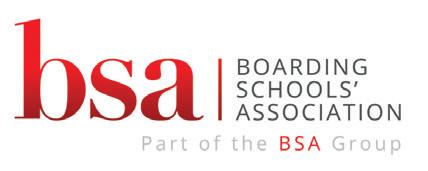 KATE HOLLYER is Legal and Public Affairs Director for BSA Group; legal@bsagroup.org.uk.
KATE HOLLYER is Legal and Public Affairs Director for BSA Group; legal@bsagroup.org.uk.

Spring 2023 | schoolmanagementplus.com | 41 PARTNERS
Kate Hollyer explains how BSA Group Legal can help boarding schools navigate the complex UKVI processes and procedures.
notoriously cumbersome...
PARTNERSHIPS
ARE WE SHOUTING IN THE RIGHT DIRECTION?
Every week, it seems, I read about a school partnership of one kind or another. For example, as I write, Headmaster Leo Winkley has announced a new “collaborative programme of character education” between Shrewsbury School and the Alpha Academies Trust, involving over 1,000 pupils with “…themed STEM days; team-building and healthyliving; [and] outdoor learning”.

So why is it that we are still hearing the same old question raised in the House of Lords, along the lines of ‘What is being done to encourage independent schools to enter into partnerships with state schools?’ The latest iteration (Hansard, 13.03.23) was about sharing sports facilities. When I hear these questions, I always ask myself, ‘Why don’t they know about the amazing work that’s going on?’
Are we missing something?
It surely can’t be a lack of communication.
The ISC, The School Partnership Alliance and Schools Together are doing tremendous work in this regard, with their Celebrating Partnerships material and associated events and lobbying. And, clearly, schools and their Heads – like Leo – frequently post about their partnerships on their social media accounts. But still, I can’t help wondering whether we’re missing something.
It’s a long time since I encountered the mindset that it’s distasteful to ‘use’ partnerships as marketing subject-matter as if this will somehow cheapen their educational integrity. No, I’m sure we’re well past that now. Could it be that the people who oversee school partnerships are often not the same people who





oversee their school’s marketing and communications? Schools are busy, full-on places and the old ‘join the dots’ chestnut can be alive and well in even the most team-orientated environment. Or might it be that schools ARE telling the good news, but perhaps not with enough strategic intent?
Stepping out
We are all – myself included – guilty of communicating with our existing networks, perpetuating one another’s perceptions but falling short of reaching new or distant audiences. Perhaps what some of us need is the ability – and permission – to tell the story of our school partnerships with a strategic, marketing mindset, reaching out to new audiences, especially politicians, and stepping out of our comfort zones to boldly ask our friends – parents, staff, alumni – to be advocates so that we are all sharing every single one of those partnership stories with ever-increasing and influential networks. I live in north Yorkshire and still remember the all-embracing way in which the founders of the York Independent State School Partnership –now in its 17th year – asked themselves ‘What do we want for our city’s children?’
Today, independent-state school partnerships are not only prolific, they are also often long-standing and substantial, with real depth of purpose and reciprocal benefits. The sheer variety of individuals, schools and networks offering opportunities to share experiences, discuss best practice, and encourage one another is staggering –as is their collective determination and desire to do their best by young people. It’s also a reflection of the high level of expertise that now exists in this field. This is a story schools must keep telling – but let’s make sure we tell everyone! ●
GILLINGHAM is CEO of AMCIS, the Association for Admissions, Marketing and Communications in Independent Schools.


PARTNERS
TORY
Tory Gillingham encourages our school communities to talk more widely about the amazing educational partnerships in which they are engaged.
42 | schoolmanagementplus.com | Spring 2023
Supercharged School Admissions and CRM

Supporting independent schools with all aspects of the admissions and marketing process, from proactive and personalised outreach, to enquiry and application management, enrolment, transitions and beyond.







OpenApply is proud to support over 700 schools, including:
Find out how your admissions process compares to best-practice independent schools!

Engage with and nurture prospective families, achieving quicker conversions and more qualified applicants



Enhance efficiency across your entire admissions process


Save 66% of your overall time

Drive your enrolment strategy with transparency and insight into your pipeline





Provide a world-class admissions experience for families and applicants alike
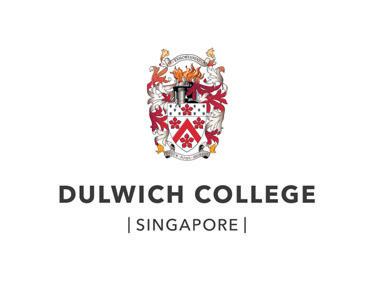

Learn more at:
openapply.com
Spring 2023 | schoolmanagementplus.com | 43











































































44 | schoolmanagementplus.com | Spring 2023 Sports Timing:: Indoor & External Pavilion T I School E P Clocks For the Swimming Pool / Sport & Leisure Centre For the Gym / Sports Hall www.sportclox.com sales@sportclox.com UK Manufactured Solar Powered Clocks For the Pavilion, Clubhouse, Pool POLO We supply Worldwide
PROFESSIONAL DEVELOPMENT THE KEY TO BEING THE BEST WE CAN BE
Conversation is key
We all know professional development is key to being the best we can be, but we often neglect it when faced with the day-today pressures of working in a school. A key focus for IDPE is to provide a tailored and relevant professional development programme, so by far my favourite two days of the year are those of our annual conference when we come together as a community. We learn, reflect, share, innovate and, most importantly, support each other.
A wealth of expertise
As the only fundraising experts in the school, with most school staff focussed (rightly so) on educating young people, there can be limited opportunities for development professionals to advance their fundraising knowledge. However, across the IDPE community there is a wealth of expertise to tap into and consequently the annual conference offers attendees the chance to learn from industry experts, share best practice, and be surrounded by like-minded individuals who are passionate about making a difference through fundraising and engagement.
Take a step back
From updating the database and writing thank you letters, to organising the next reunion or arranging a meeting with a prospect, juggling the competing priorities of a busy development office can make it difficult to take time out. The annual conference offers the chance to take the time to reflect and see things from a different perspective, whilst at the same time allowing you to step outside your comfort zone, listen to new ideas, share new ways of working and renew your focus on taking your development programme to the next level.
In today’s digital environment, the opportunities for debating a solution to a challenge you are facing, or merely having a casual conversation with a peer over coffee, are becoming rarer. This year, our organising committee has therefore replaced the traditional opening keynote address with 90-minute workshop sessions, thereby putting the emphasis on conversation right from the start of the day.
A focus on wellbeing
From strengthening your resilience and learning to say no, to managing up and career development, we have included a number of practical sessions in this year’s programme as part of our personal effectiveness stream. These are designed to help to provide you with the tools to be an effective schools’ development professional.
A network of support
Being part of a professional community can give a sense of belonging and, for many small or oneperson development teams, be a welcome reminder that you are not alone in your work. From our conference connectors (a friendly face for those new to conference), to tailored networking over lunch, this year’s conference will offer plenty of opportunities to make new friends, connect with old ones and grow a network of support at conference and beyond.
Join us
Whether you are a development professional, head, bursar, or governor; just starting out on your development journey or working in a school with a more established development office, join us at the IDPE 2023 Annual Conference on Monday 15 and Tuesday 16 May 2023 at the East Midlands Conference Centre, Nottingham (day delegate places are available). For more information, visit idpe.org.uk. ●

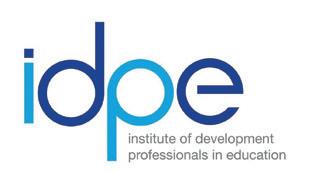
Spring 2023 | schoolmanagementplus.com | 45 PARTNERS
Louise Bennett urges development professionals to make time to share ideas and build networks at IDPE’s annual conference.
LOUISE BENNETT is CEO of IDPE.
COST CERTAINTY FOR PREMIUM SPORTS FACILITIES
The high cost of construction materials continues to impact new build projects across the UK. Indeed, the government has just delayed the next stage of its high speed railway project HS2 for two years citing significant inflationary pressure and increased project costs.
It’s a real concern for schools, with many discovering their planned sports projects are now prohibitively expensive. Like the government, some will be forced to put their schemes on hold and some will scale back their proposals, while others may have to scrap their plans all together.
But there is a way school estate managers can keep control of costs and progress with their new sports buildings, all while meeting their net zero targets.
Providing cost surety
As specialists in the design and delivery of premium tensile structures for the UK sport and education sectors, we provide exceptional sports structures that outperform traditional sports buildings, yet cost a fraction of the price.
Our partner company Sprung Structures, located in Canada, has all the materials needed for sports buildings already in stock. It takes three/four weeks to complete the order plus four/five weeks to ship to the UK, meaning your new sports facility project could start just two months from your order date.
And, because the building materials are already in stock, the price you are quoted when you place your order, is the price you will pay.
Faster and smarter build
Using patented technology and developed following years of extensive research and development, our tensile membrane structures are a quick, robust and costeffective alternative to traditionally built sports facilities.
They are also significantly faster to build than traditional sports buildings – a 1,000m2 insulated structure is typically erected in just 44 days, representing dramatic savings in time and money.

Our structures can be delivered with up to 40 per cent cheaper capital costs than traditional buildings. Their outstanding thermal performance means they have less heating demands than a typical traditional sports facility, resulting in lower operating costs. They also require minimal maintenance for further savings.
Reach your net zero targets
With a BREEAM rating of Excellent, our sports buildings benefit from outstanding environmental performance. The structures are tensioned inside and out for airtightness performance that approaches Passivhaus levels. The structures meet June 2022 building regulations regarding thermal efficiency and U-values. High specification fibreglass insulation in the walls and roof of the building ensure better climate control, while absorbing sound and reverberation for great acoustics – a rarity in school sports buildings. Plus, the roofs of the buildings are the ideal pitch for solar panels. By installing our specialist solar panel system, schools can generate electricity to save on their overall energy bills. Our future proof structures also meet LETI 2030 School Target of 350kg CO2 per m2 Contact us to learn more about sustainable, net zero ready and cost-effective solutions for premium sports facilities. ●
www.paragonstructures.com
info@paragonstructures.com
01225 618188
46 | schoolmanagementplus.com | Spring 2023 ADVERTORIAL
High construction costs and inflation are making some new sports facility projects unviable, but there is a way to keep control of your costs and your project on track.
12 | schoolmanagementplus.com | Spring 2023
“Paragon’s sprung structure solution was unbeatable; we essentially ended up with two new buildings for the price of one traditionally built, both delivered in just seven months from start to finish,” – Millfield School, head of estates, Neil Chapillon.
BESPOKE, NET ZERO-READY SPORTS STRUCTURES



LOWER COSTS
Up to 40% cheaper capital costs and reduced foundation costs
SUPERIOR AIRTIGHTNESS
Tensioned inside and out for an exceptional airtightness rating of <1.0m³/h.m² at 50 Pa, which exceeds new building regulations and approaches Passivhaus levels
PREMIUM INSULATION
Structures meet all UK building regulations for thermal efficiency, U-values and safety regulations
LOW EMBODIED CARBON
Meets LETI 2030 School Target of 350kg CO2/m2
Spring 2023 | schoolmanagementplus.com | 47
01225 618188 | info@paragonstructures.com | www.paragonstructures.com

A TOTAL CURRICULAR APPROACH
THE BEST WAY TO DELIVER A ROUNDED EDUCATION?
James Priory believes that independent schools are wellplaced to drive innovative thinking around curricular design. He suggests they take a lead in building academic programmes which respond to both national priorities and evolving student preferences for a more personalised menu of core and elective courses.


The Prime Minister’s announcement of an ambition for all school pupils to study mathematics until the age of 18 stirred up a brief but intense debate earlier this year.
Many questioned whether Rishi Sunak had done the numbers, given the challenge of implementing such an initiative against a national decline in the recruitment of maths teachers. Others, accepting that numeracy is an important life skill and strengthens employability, questioned why maths needed to become compulsory when it is already the most popular A-level subject and is studied as a continuation GCSE.
British Baccalaureate
The announcement was not made in a vacuum. The Times Education Commission, which concluded its report last year, proposed a British Baccalaureate which would combine academic and vocational qualifications at 18. Sunak himself has spoken previously about sustaining English and maths post-16.
What was surprising, however, was that there had been so little consultation and thus the charge that compulsory study of maths added up to little more than a prime ministerial pet project: an example, if one was needed, of why the Times Education Commission has called for a 15-year strategic approach to policy, tired of seeing education as a political football. F
TALKING POINT - TALKING POINT -
...prime ministerial pet project …
James Priory
Spring 2023 | schooladmissionsplus.com | 49
Headmaster of Tonbridge School.
Maximising pupils’ learning

In my experience, curriculum design is a mixture of the visionary and pragmatic. Time is a precious but limited resource, even in the context of a boarding school where time can be particularly generous. Ultimately, there are choices to be made about how the school day and week can best be used to maximise pupils’ learning, to equip them with the knowledge, skills and aptitudes they need, while sustaining their personal development and enjoyment.
It is in such choices, however, that creativity lies and the opportunity to turn vision into educational strategy which enriches the lives and imaginations of the young people we teach.
As someone who sat maths rather ingloriously in the inaugural year of GCSE, I feel some sympathy with Sunak’s proposal. I would like to see the so-called academic and vocational better integrated and more equally valued in our system. However, I also flinch at the functional way in which the initiative was announced, leaving so many questions unanswered about the overall vision for young people’s learning and their educational journey.
Personalised menu
Like many schools, we found ourselves compelled to be innovative in our approach to curricular design during lockdown. Inspired by the idea of connecting ‘Fine Minds and Good Hearts’, we launched a new Sixth Form Curriculum virtually in summer 2020, offering multiple A-level pathways and a more personalised menu of core and elective courses. New subjects included A-level Computer Science, European language qualifications, the Extended Project Qualification and, best of all, cookery as a life skill.
While GCSE has become the focus of national debate about the future of assessments, we feel fortunate to be able to combine domestic and international qualifications in a programme which promotes super-curricular opportunities for extension alongside the broad cocurricular experience and community engagement so many pupils in our schools enjoy. We may well see the number of GCSEs reduce nationally in future, but a total curricular approach will always be key, I believe, if we are to deliver a genuinely rounded education.
Breadth and depth
Interestingly, many schools are considering innovation in Year 9, which is especially
open about future pathways, while also preparing for assessment at 16+. Hence our decision to opt for a Year 9 carousel of creative subjects in which pupils can specialise, while sustaining a core programme of digital learning, ancient and modern languages, humanities, sciences, English and maths. PSHEE, which has been enhanced considerably in our schools in recent years, now plays a valuable role as pastoral education.
Empowering
As independent schools, we sometimes forget just how empowering it is to be able to think freely about the curriculum we design for our pupils’ growth and learning.
There are inspiring examples across our schools of innovative courses and qualifications. The opportunities

possible when we genuinely
and beyond our
TALKING POINT
...visionary and pragmatic...
50 | schoolmanagementplus.com | Spring 2023
...carousel of creative subjects...
ENVIRONMENT A Sporting
Our goal is to inspire everyone to participate, building confidence and a love of sport.
As the #1 sportswear brand for independent schools, we have a responsibility to create performance kit ethically and sustainably, instilling pride across the school whilst caring for the planet along the way.

LIMITLESSKIT.COM

ETHICAL AND SUSTAINABLE SPORTSWEAR

SPORTSWEAR BY



















CREATED WITH RESPECT DELIVERED WITH SIMPLICITY WORN WITH PRIDE UNIFORM + SPORTSWEAR www.schoolblazer.com | info@schoolblazer.com | 01832 280011 limitlesskit.com

















 Incorporating Conference & Common Room
Incorporating Conference & Common Room








































 Chief Executive of the Independent Schools Council.
Chief Executive of the Independent Schools Council.





































































































































 KATE HOLLYER is Legal and Public Affairs Director for BSA Group; legal@bsagroup.org.uk.
KATE HOLLYER is Legal and Public Affairs Director for BSA Group; legal@bsagroup.org.uk.




















































































































